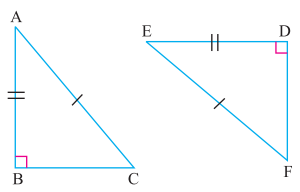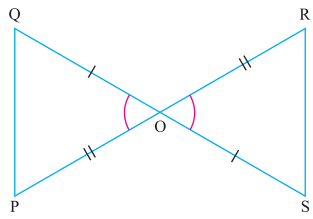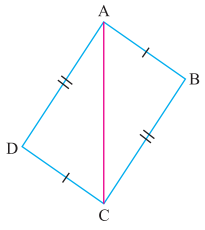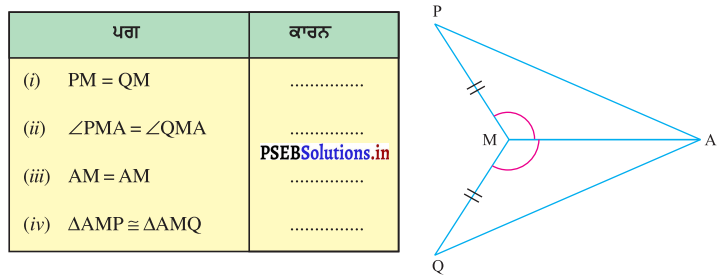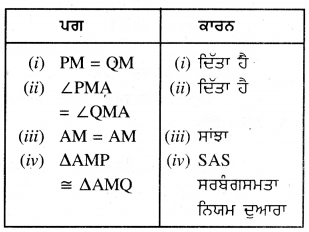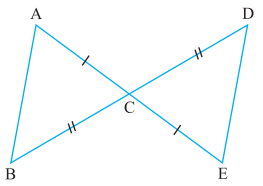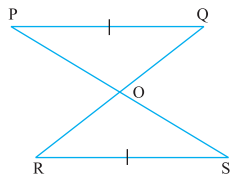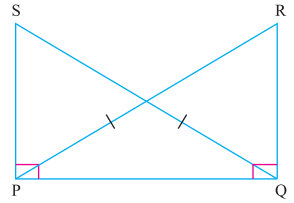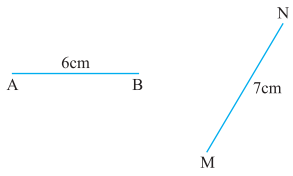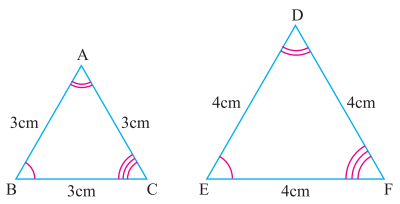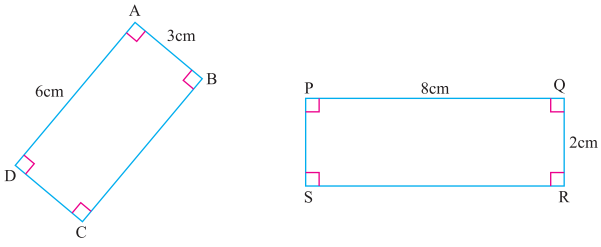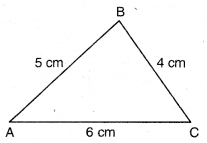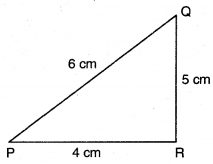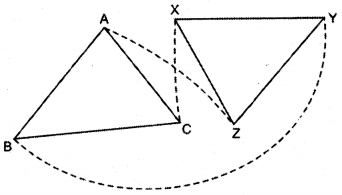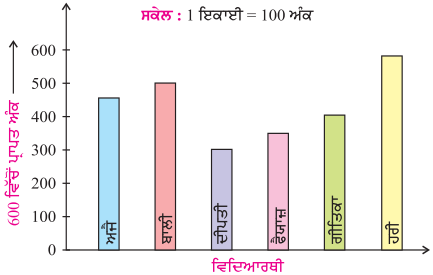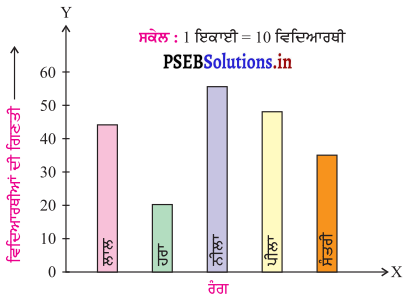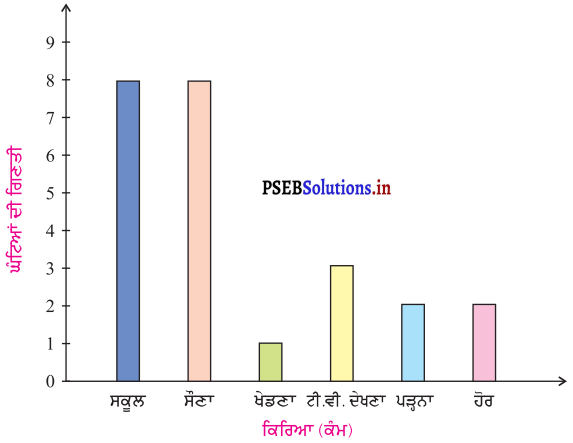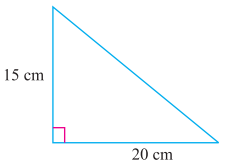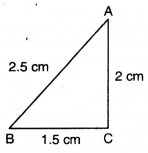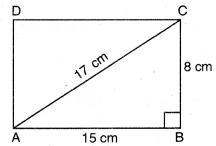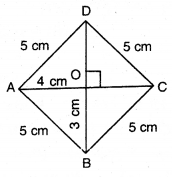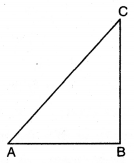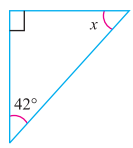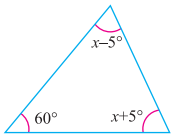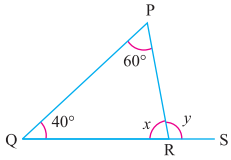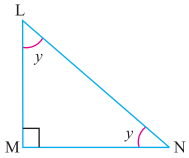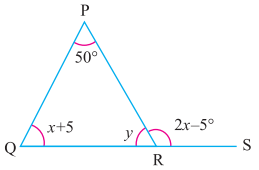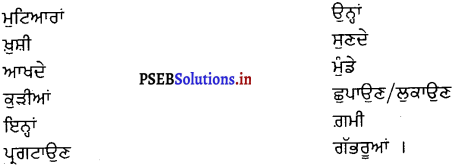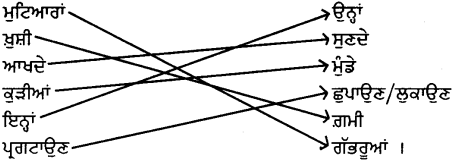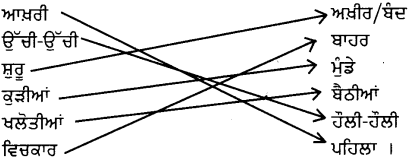Punjab State Board PSEB 8th Class Punjabi Book Solutions Chapter 12 ਪੰਜਾਬ ਦਾ ਸੁਪਨਸਾਜ਼ ਡਾ. ਮਹਿੰਦਰ ਸਿੰਘ ਰੰਧਾਵਾ Textbook Exercise Questions and Answers.
PSEB Solutions for Class 8 Punjabi Chapter 12 ਪੰਜਾਬ ਦਾ ਸੁਪਨਸਾਜ਼ ਡਾ. ਮਹਿੰਦਰ ਸਿੰਘ ਰੰਧਾਵਾ (1st Language)
Punjabi Guide for Class 8 PSEB ਪੰਜਾਬ ਦਾ ਸੁਪਨਸਾਜ਼ ਡਾ. ਮਹਿੰਦਰ ਸਿੰਘ ਰੰਧਾਵਾ Textbook Questions and Answers
ਪੰਜਾਬ ਦਾ ਸੁਪਨਸਾਜ਼ ਡਾ. ਮਹਿੰਦਰ ਸਿੰਘ ਰੰਧਾਵਾ ਪਾਠ-ਅਭਿਆਸ
1. ਦੱਸੋ :
(ਉ) ਡਾ. ਮਹਿੰਦਰ ਸਿੰਘ ਰੰਧਾਵਾ ਕਿੱਥੋਂ ਦੇ ਜੰਮ-ਪਲ ਸਨ ? ਉਹਨਾਂ ਨੇ ਕਿਹੜੀ-ਕਿਹੜੀ ਵਿੱਦਿਅਕ ਯੋਗਤਾ ਪ੍ਰਾਪਤ ਕੀਤੀ ?
ਉੱਤਰ :
ਡਾ: ਮਹਿੰਦਰ ਸਿੰਘ ਰੰਧਾਵਾ ਪੰਜਾਬ ਦੇ ਜੰਮਪਲ ਸਨ। ਆਪ ਨੇ ਲਾਹੌਰ ਤੋਂ ਐੱਮ. ਐੱਸ. ਸੀ. ਕਰਨ ਮਗਰੋਂ 1934 ਵਿਚ ਲੰਡਨ ਤੋਂ ਆਈ. ਸੀ. ਐੱਸ. ਦੀ ਪ੍ਰਤੀਯੋਗਤਾ ਪਾਸ ਕੀਤੀ। ਬਨਸਪਤੀ ਵਿਗਿਆਨ ਸੰਬੰਧੀ ਖੋਜ ਕਰਨ ਤੇ ਆਪ ਨੂੰ ਪੰਜਾਬ ਯੂਨੀਵਰਸਿਟੀ ਨੇ ਡਾਕਟਰ ਦੀ ਡਿਗਰੀ ਦਿੱਤੀ।
(ਅ) ਇੱਕ ਅਧਿਕਾਰੀ ਵਜੋਂ ਡਾ. ਰੰਧਾਵਾ ਕਿਹੜੇ-ਕਿਹੜੇ ਮੁੱਖ ਅਹੁਦਿਆਂ ‘ਤੇ ਸਸ਼ੋਭਿਤ ਰਹੇ ?
ਉੱਤਰ :
ਇਕ ਅਧਿਕਾਰੀ ਵਜੋਂ ਡਾ: ਰੰਧਾਵਾ ਉੱਤਰ : ਪ੍ਰਦੇਸ਼, ਦਿੱਲੀ, ਹਰਿਆਣਾ ਤੇ ਪੰਜਾਬ ਵਿਚ ਵੱਖ – ਵੱਖ ਅਹੁਦਿਆਂ ‘ਤੇ ਕੰਮ ਕਰਦੇ ਰਹੇ। ਆਪ ਨੇ ਪੰਜਾਬ ਦੇ ਵਿਕਾਸ ਕਮਿਸ਼ਨਰ ਵਜੋਂ ਵੀ ਕੰਮ ਕੀਤਾ। ਆਪ ਚੰਡੀਗੜ੍ਹ ਦੇ ਮੁੱਖ ਕਮਿਸ਼ਨਰ ਵੀ ਰਹੇ ਤੇ ਪੰਜਾਬ ਖੇਤੀ – ਬਾੜੀ ਯੂਨੀਵਰਸਿਟੀ ਲੁਧਿਆਣਾ ਦੇ ਉਪ – ਕੁਲਪਤੀ ਵੀ ਰਹੇ।

(ੲ) ਪੰਜਾਬ ਵਿੱਚ ਖੇਤੀ-ਬਾੜੀ ਨੂੰ ਉੱਨਤ ਕਰਨ ਲਈ ਡਾ. ਰੰਧਾਵਾ ਦਾ ਕੀ ਯੋਗਦਾਨ ਹੈ ?
ਉੱਤਰ :
ਪੰਜਾਬ ਵਿਚ ਖੇਤੀਬਾੜੀ ਨੂੰ ਉੱਨਤ ਕਰਨ ਲਈ ਡਾ: ਰੰਧਾਵਾ ਨੇ ਇੱਥੋਂ ਦੀ ਖੇਤੀ ਦਾ ਟਰੈਕਟਰਾਂ ਤੇ ਟਿਊਬਵੈੱਲਾਂ ਰਾਹੀਂ ਮਸ਼ੀਨੀਕਰਨ ਕਰਨ ਤੋਂ ਇਲਾਵਾ ਕਿਸਾਨਾਂ ਵਿਚ ਵਿਗਿਆਨਿਕ ਢੰਗਾਂ ਨਾਲ ਖੇਤੀ ਕਰਨ ਦੀ ਸੂਝ ਪੈਦਾ ਕਰਨ ਦਾ ਇਰਾਦਾ ਕੀਤਾ, ਤਾਂ ਜੋ ਉਨ੍ਹਾਂ ਨੂੰ ਚੰਗੇ ਬੀਜਾਂ, ਰਸਾਇਣਿਕ ਖਾਦਾਂ ਤੇ ਕੀੜੇ – ਮਾਰ ਦਵਾਈਆਂ ਦੀ ਵਰਤੋਂ ਦਾ ਪਤਾ ਲੱਗ ਸਕੇ। ਪੰਜਾਬ ਖੇਤੀਬਾੜੀ ਯੂਨੀਵਰਸਿਟੀ ਦੀ ਵਾਗ – ਡੋਰ ਸੰਭਾਲ ਕੇ ਆਪ ਨੇ ਕਿਸਾਨਾਂ ਨੂੰ ਉੱਨਤ ਖੇਤੀ ਦੇ ਢੰਗਾਂ ਦੀ ਸਿਖਲਾਈ ਦੇਣ ਲਈ ਵਿਸ਼ੇਸ਼ ਕੰਮ ਕੀਤੇ।
ਇਸ ਸੰਬੰਧੀ ਆਪ ਨੇ ਯੂਨੀਵਰਸਿਟੀ ਵਿਚ ਇਕ ਵਿਭਾਗ ਕਾਇਮ ਕੀਤਾ, ਜੋ ਕਿ ਉੱਨਤ ਖੇਤੀ ਬਾਰੇ ਜਾਣਕਾਰੀ ਦੇਣ ਵਾਲਾ ਸਾਹਿਤ ਛਾਪ ਕੇ ਕਿਸਾਨਾਂ ਵਿਚ ਮੁਫ਼ਤ ਵੰਡਦਾ ਹੈ। ਆਪ ਦੀਆਂ ਕੋਸ਼ਿਸ਼ਾਂ ਸਦਕਾ ਹੀ ਹੁਣ ਤਕ ਖੇਤੀ ਦੇ ਮਾਹਰ ਕਿਸਾਨ ਮੇਲੇ ਲਾ ਕੇ ਜ਼ਿਮੀਂਦਾਰਾਂ ਦੀਆਂ ਮੁਸ਼ਕਿਲਾਂ ਦੇ ਹੱਲ ਲਈ ਅਮਲੀ ਰੂਪ ਵਿਚ ਹਾਜ਼ਰ ਹੁੰਦੇ ਹਨ।
(ਮ) ਮਹਿੰਦਰ ਸਿੰਘ ਰੰਧਾਵਾ ਸਾਹਿਤ ਦੇ ਖੇਤਰ ਵਿੱਚ ਕਿਉਂ ਪ੍ਰਸਿੱਧ ਹੋਏ ?
ਉੱਤਰ :
ਡਾ: ਰੰਧਾਵਾ ਨੇ ਸਾਹਿਤ, ਸਭਿਆਚਾਰ ਤੇ ਗਿਆਨ – ਵਿਗਿਆਨ ਨਾਲ ਸੰਬੰਧਿਤ ਬਹੁਤ ਸਾਰੀਆਂ ਪੁਸਤਕਾਂ ਲਿਖੀਆਂ। ਆਪ ਨੇ ਪੰਜਾਬ, ਹਰਿਆਣਾ, ਹਿਮਾਚਲ ਪ੍ਰਦੇਸ਼, ਕਾਂਗੜੇ ਤੇ ਕੁੱਲੂ ਦੇ ਖੇਤਰ ਵਿਚੋਂ ਲੋਕ – ਗੀਤ ਇਕੱਠੇ ਕੀਤੇ ਤੇ ਉਨ੍ਹਾਂ ਨੂੰ ਲੋਕਾਂ ਦੇ ਅੰਦਾਜ਼ ਵਿਚ ਲਿਖਿਆ। ਇਸ ਤੋਂ ਬਿਨਾਂ ਉਹ ਆਪ ਕਲਾਕਾਰਾਂ ਤੇ ਸਾਹਿਤਕਾਰਾਂ ਦੇ ਕਦਰਦਾਨ ਸਨ ਤੇ ਪੰਜਾਬੀ ਬੋਲੀ ਨੂੰ ਬਹੁਤ ਪਿਆਰ ਕਰਦੇ ਸਨ। ਇਸੇ ਕਰਕੇ ਉਹ ਸਾਹਿਤ ਦੇ ਖੇਤਰ ਵਿਚ ਪ੍ਰਸਿੱਧ ਹੋਏ।
(ਹ) ਵਿਗਿਆਨ ਦੇ ਖੇਤਰ ਨਾਲ ਡਾ. ਰੰਧਾਵਾ ਦਾ ਨਾਂ ਕਿਵੇਂ ਜੁੜਿਆ ਹੋਇਆ ਹੈ ?
ਉੱਤਰ :
ਡਾ: ਰੰਧਾਵਾ ਐੱਮ. ਐੱਸ. ਸੀ. ਪਾਸ ਹੋਣ ਕਰ ਕੇ ਇਕ ਵਿਗਿਆਨੀ ਸਨ। ਉਨ੍ਹਾਂ ਨੂੰ ਬਨਸਪਤੀ ਵਿਗਿਆਨ ਬਾਰੇ ਖੋਜ ਕਰਨ ਉੱਤੇ ਪੰਜਾਬ ਯੂਨੀਵਰਸਿਟੀ ਨੇ ਡਾਕਟਰ ਦੀ ਡਿਗਰੀ ਦਿੱਤੀ। ਇਸ ਤਰ੍ਹਾਂ ਉਨ੍ਹਾਂ ਦਾ ਨਾਂ ਵਿਗਿਆਨ ਦੇ ਖੇਤਰ ਨਾਲ ਜੁੜਿਆ ਹੋਇਆ ਹੈ।
(ਕ) ਡਾ. ਮਹਿੰਦਰ ਸਿੰਘ ਰੰਧਾਵਾ ਦੀ ਸੋਚ ਤੇ ਸੁਭਾਅ ਬਾਰੇ ਪਾਠ ਵਿੱਚ ਕੀ ਦੱਸਿਆ ਹੋਇਆ ਹੈ ?
(੫) ਪੰਜਾਬ ਨੂੰ ਸੋਹਣਾ ਬਣਾਉਣ ਲਈ ਡਾ. ਰੰਧਾਵਾ ਨੇ ਕੀ ਜਤਨ ਕੀਤੇ ?
ਉੱਤਰ :
ਜਦੋਂ ਡਾ: ਰੰਧਾਵਾ ਪੰਜਾਬ ਦੇ ਵਿਕਾਸ ਕਮਿਸ਼ਨਰ ਬਣੇ ਤਾਂ ਉਨਾਂ ਨੇ ਦਿੜ ਇਰਾਦਾ ਕਰ ਲਿਆ ਕਿ ਉਹ ਪੰਜਾਬ ਦੇ ਪਿੰਡਾਂ ਨੂੰ ਅਜਿਹੇ ਬਣਾ ਦੇਣਗੇ, ਜਿੱਥੇ ਟਰੈਕਟਰ ਫਪ ਫਪ ਕਰਦੇ ਫਿਰਨ। ਟਿਊਬਵੈੱਲ ਖੇਤਾਂ ਨੂੰ ਪਾਣੀ ਨਾਲ ਸਿੰਜਦੇ ਹੋਣ। ਕਿਸਾਨਾਂ ਵਿਚ ਨਵੇਂ ਢੰਗ ਨਾਲ ਖੇਤੀ ਕਰਨ ਦੀ ਸੂਝ ਹੋਵੇ ਅਤੇ ਖੇਤਾਂ ਵਿਚ ਹੀ ਉਨ੍ਹਾਂ ਦੇ ਸੁੰਦਰ ਫੁੱਲਾਂ ਨਾਲ ਸਜੇ ਘਰ ਹੋਣ ! ਹਰ ਪਿੰਡ ਵਿਚ ਮਸ਼ੀਨਾਂ ਦੀ ਮੁਰੰਮਤ ਦੀਆਂ ਸਹੂਲਤਾਂ ਹੋਣ ਅਤੇ ਲੋਕ ਰਸਾਇਣਿਕ ਖਾਦਾਂ ਤੇ ਖੇਤੀ ਦੇ ਉੱਨਤ ਢੰਗਾਂ ਦੇ ਗੁਣ ਅਤੇ ਵਰਤੋਂ ਜਾਣਦੇ ਹੋਣ।
ਫਿਰ ਜਦੋਂ ਉਹ ਪੰਜਾਬ ਖੇਤੀਬਾੜੀ ਯੂਨੀਵਰਸਿਟੀ ਦੇ ਉਪ – ਕੁਲਪਤੀ ਬਣੇ, ਤਾਂ ਉਨ੍ਹਾਂ ਨੇ ਲੋਕਾਂ ਨੂੰ ਵਿਗਿਆਨਿਕ ਖੇਤੀਬਾੜੀ ਸੰਬੰਧੀ ਜਾਣਕਾਰੀ ਦੇਣ ਲਈ ਯੂਨੀਵਰਸਿਟੀ ਵਿਚ ਇਕ ਵਿਭਾਗ ਕਾਇਮ ਕੀਤਾ, ਜੋ ਫ਼ਸਲਾਂ ਸੰਬੰਧੀ ਹਰ ਪ੍ਰਕਾਰ ਦੀ ਜਾਣਕਾਰੀ ਨੂੰ ਛਾਪ ਕੇ ਕਿਸਾਨਾਂ ਵਿਚ ਮੁਫ਼ਤ ਵੰਡਦਾ ਹੈ। ਉਨ੍ਹਾਂ ਨੇ ਕਿਸਾਨ ਮੇਲੇ ਆਰੰਭ ਕੀਤੇ, ਜਿਨ੍ਹਾਂ ਵਿਚ ਖੇਤੀਬਾੜੀ ਮਾਹਰ ਲੋਕਾਂ ਦੀਆਂ ਮੁਸ਼ਕਿਲਾਂ ਦੇ ਹੱਲ ਲਈ ਆਪ ਹਾਜ਼ਰ ਹੁੰਦੇ ਹਨ !

(ਗ) ਡਾ. ਰੰਧਾਵਾ ਨੇ ਲੁਧਿਆਣਾ ਵਿਖੇ ‘ਪੇਂਡੂ ਅਜਾਇਬ-ਘਰ’ ਕਿਸ ਮਨੋਰਥ ਨਾਲ ਸਥਾਪਿਤ ਕੀਤਾ ?
ਉੱਤਰ :
ਡਾ: ਰੰਧਾਵਾ ਇਸ ਗੱਲ ਬਾਰੇ ਸਪੱਸ਼ਟ ਸਨ ਕਿ ਪੱਛਮ ਦੀ ਰੌਸ਼ਨੀ ਪੰਜਾਬ ਦੇ ਘਰਾਂ ਦੀਆਂ ਅੰਦਰਲੀਆਂ ਨੁੱਕਰਾਂ ਤਕ ਪਹੁੰਚ ਚੁੱਕੀ ਹੈ। ਉਨ੍ਹਾਂ ਨੂੰ ਵਿਸ਼ਵਾਸ ਹੋ ਗਿਆ ਸੀ ਕਿ ਚੱਕੀ, ਚਿਮਟਾ, ਚਰਖਾ, ਪੀੜੀਆਂ ਤੇ ਮੁੜੇ ਛੇਤੀ ਹੀ ਪੰਜਾਬ ਦੇ ਜੀਵਨ ਵਿਚੋਂ ਨਿਕਲ ਜਾਣਗੇ ਤੇ ਜੇਕਰ ਇਹ ਲਾਪਰਵਾਹੀ ਵਿਚ ਹੀ ਅਲੋਪ ਹੋ ਗਏ, ਤਾਂ ਪੰਜਾਬੀਆਂ ਦਾ ਅਮੀਰ ਵਿਰਸਾ ਅਲੋਪ ਹੋ ਜਾਵੇਗਾ। ਸੋ ਆਪਣੇ ਅਮੀਰ ਵਿਰਸੇ ਨੂੰ ਸੰਭਾਲਣ ਲਈ ਆਪ ਨੇ ਲੁਧਿਆਣਾ ਵਿਖੇ ਪੇਂਡੂ ਜੀਵਨ ਦਾ ਅਜਾਇਬ ਘਰ ਕਾਇਮ ਕੀਤਾ।
ਇਸ ਕਰਕੇ ਇਸ ਦੀ ਇਮਾਰਤ ਨਾਨਕਸ਼ਾਹੀ ਇੱਟਾਂ ਨਾਲ ਬਣਾਈ ਗਈ। ਇਸ ਵਿਚ ਪਿੰਡਾਂ ਵਿਚ ਵਰਤੀਆਂ ਜਾਂਦੀਆਂ ਰਸੋਈ ਦੀਆਂ ਚੀਜ਼ਾਂ ਥਾਲ, ਕੌਲੇ, ਗਲਾਸ, ਛੰਨੇ, ਮਿੱਟੀ ਦੀਆਂ ਟਿੰਡਾਂ, ਝਵੱਕਲੀ ਤੇ ਬੈੜ ਆਦਿ ਤੋਂ ਲੈ ਕੇ ਪੇਂਡੂ ਸਵਾਣੀਆਂ ਦੀਆਂ ਹੱਥੀਂ ਤਿਆਰ ਕੀਤੀਆਂ ਦਰੀਆਂ, ਫੁੱਲਕਾਰੀਆਂ ਤੇ ਬਾਗਾਂ ਨੂੰ ਇਸ ਅਜਾਇਬ – ਘਰ ਵਿਚ ਸਾਂਭਿਆ ਗਿਆ ਹੈ। ਇਸ ਤਰ੍ਹਾਂ ਪੁਰਾਣੇ ਪੰਜਾਬ ਦਾ ਚਿਹਰਾ – ਮੋਹਰਾ ਦੇਖਣ ਲਈ ਇਹ ਅਜਾਇਬ – ਘਰ ਸ਼ੀਸ਼ੇ ਦਾ ਕੰਮ ਕਰਦਾ ਰਹੇਗਾ।
(ਘ) ਚੰਡੀਗੜ੍ਹ ਨੂੰ ਡਾ. ਰੰਧਾਵਾ ਦੀ ਕੀ ਦੇਣ ਹੈ ?
ਉੱਤਰ :
ਚੰਡੀਗੜ੍ਹ ਨੂੰ ਸੋਹਣਾ ਬਣਾਉਣ ਵਿਚ ਵੀ ਡਾ: ਰੰਧਾਵਾ ਦਾ ਅਹਿਮ ਹਿੱਸਾ ਹੈ। ਚੰਡੀਗੜ੍ਹ ਦੇ ਰੋਜ਼ ਗਾਰਡਨ ਵਿਚ ਇਕ ਹਜ਼ਾਰ ਤੋਂ ਵੱਧ ਗੁਲਾਬ ਦੇ ਫੁੱਲਾਂ ਦੀਆਂ ਵੰਨਗੀਆਂ ਹਨ, ਜਿਹੜੀਆਂ ਦੂਜੇ ਮੁਲਕਾਂ ਅਤੇ ਰਾਜਾਂ ਤੋਂ ਉਚੇਚੇ ਤੌਰ ‘ਤੇ ਮੰਗਵਾਈਆਂ ਗਈਆਂ ਸਨ। ਚੰਡੀਗੜ੍ਹ ਦੀਆਂ ਸੜਕਾਂ ਦੇ ਦੋਹੀਂ ਪਾਸੀਂ ਲੱਗੇ ਸਜਾਵਟੀ ਬੂਟੇ ਅਤੇ ਦਰੱਖ਼ਤ ਦੂਰ – ਦੁਰਾਡੀਆਂ ਧਰਤੀਆਂ ਤੋਂ ਮੰਗਵਾਏ ਗਏ।
ਡਾ: ਰੰਧਾਵਾ ਵਲੋਂ ਚੰਡੀਗੜ ਦੇ ਸੈਕਟਰ 10 ਵਿਚ ਬਣਾਈ ਗਈ ਆਰਟ ਗੈਲਰੀ ਵਿਚ ਹਜ਼ਾਰਾਂ ਦੀ ਗਿਣਤੀ ਵਿਚ ਭਾਰਤ ਅਤੇ ਪੰਜਾਬ ਦੇ ਵੱਡੇ – ਵੱਡੇ ਕਲਾਕਾਰਾਂ ਦੀਆਂ ਕਲਾ – ਕਿਰਤਾਂ ਦੀ ਪਰਦਰਸ਼ਨੀ ਆਮ ਦਰਸ਼ਕਾਂ ਨੂੰ ਮੋਹ ਲੈਂਦੀ ਹੈ ਸਮੇਂ – ਸਮੇਂ ਚਿਤਰਾਂ ਦੀ ਨੁਮਾਇਸ਼ ਲਾਉਣ ਲਈ ਇਕ ਵਿਸ਼ੇਸ਼ ਹਾਲ ਬਣਾਇਆ ਗਿਆ, ਜਿੱਥੇ ਕਿਸੇ ਨਾ ਕਿਸੇ ਕਲਾਕਾਰ ਦੀਆਂ ਕਿਰਤਾਂ ਦੀ ਨੁਮਾਇਸ਼ ਲੱਗੀ ਹੀ ਰਹਿੰਦੀ ਹੈ।
ਰੰਧਾਵਾ ਸਾਹਿਬ ਦੇ ਯਤਨਾਂ ਸਦਕਾ ਹੀ ਕਲਾਕਾਰਾਂ ਦੀਆਂ ਕਲਾ – ਕਿਰਤਾਂ ਖ਼ਰੀਦ ਕੇ ਸਰਕਾਰੀ ਦਫ਼ਤਰਾਂ ਅਤੇ ਅਮੀਰ ਲੋਕਾਂ ਦੇ ਘਰਾਂ ਵਿਚ ਸਜਾਈਆਂ ਜਾਂਦੀਆਂ ਹਨ। ਰੋਜ਼ – ਗਾਰਡਨ ਦੇ ਉੱਤਰ ਵਾਲੇ ਹਿੱਸੇ ਵਿਚ ਆਪ ਨੇ ਪੰਜਾਬ ਦੇ ਸਾਹਿਤਕਾਰਾਂ, ਨਾਟਕਕਾਰਾਂ ਅਤੇ ਕਲਾਕਾਰਾਂ ਦੀਆਂ ਸ਼ਖ਼ਸੀਅਤਾਂ ਨੂੰ ਉਭਾਰਨ ਲਈ ‘ਪੰਜਾਬ ਕਲਾ ਪਰਿਸ਼ਦ ਕਾਇਮ ਕੀਤੀ। ਉਨ੍ਹਾਂ ਪੁਰਾਣੀ ਅਤੇ ਨਵੀਂ ਪੀੜ੍ਹੀ ਦੇ ਹਜ਼ਾਰਾਂ ਕਲਾਕਾਰਾਂ ਨੂੰ ਉਤਸ਼ਾਹ ਦਿੱਤਾ।
2. ਔਖੇ ਸ਼ਬਦਾਂ ਦੇ ਅਰਥ :
- ਬਹੁਪੱਖੀ : ਕਈ ਪੱਖਾਂ ਜਾਂ ਪਹਿਲੂਆਂ ਵਾਲੀ
- ਕਾਰਜ-ਖੇਤਰ : ਕੰਮ-ਕਾਜ ਦਾ ਦਾਇਰਾ
- ਅੰਦਾਜ਼ ; ਤੌਰ-ਤਰੀਕਾ
- ਪ੍ਰਤਿਯੋਗਤਾ : ਮੁਕਾਬਲਾ
- ਵਿਕਾਸ : ਤਰੱਕੀ, ਉੱਨਤੀ
- ਯੋਗਦਾਨ : ਦੇਣ, ਸਹਿਯੋਗ
- ਹੁਨਰ : ਕਿਸੇ ਕੰਮ ਵਿੱਚ ਮੁਹਾਰਤ, ਕਲਾ, ਕਾਰੀਗਰੀ
- ਪ੍ਰਮਾਣਿਕ : ਸਹੀ, ਜਿਸ ਦਾ ਕੋਈ ਪ੍ਰਮਾਣ ਹੋਵੇ
- ਵਿਸ਼ਾਲ : ਵੱਡਾ
- ਸਿਰਜਣਾ : ਰਚਨਾ, ਬਣਾਉਣਾ, ਉਤਪੰਨ
- ਪਸਾਰ : ਫੈਲਾਅ, ਖਿਲਾਰ, ਵਿਸਥਾਰ

3. ਵਾਕਾਂ ਵਿੱਚ ਵਰਤੋਂ :
ਸਸ਼ੋਭਿਤ, ਖ਼ਲਕਤ, ਸਹੂਲਤ, ਉਪਰਾਲੇ, ਤਿਭਾ, ਵਾਗ-ਡੋਰ, ਸੁਹਿਰਦਤਾ, ਸਹਿਯੋਗੀ, ਰੁਜ਼ਗਾਰ, ਸ਼ਖ਼ਸੀਅਤ, ਤਾੜਨਾ, ਰਿਣੀ
ਉੱਤਰ :
- ਸੁਸ਼ੋਭਿਤ (ਸ)਼ੋਭ ਰਿਹਾ) – ਮਹਾਰਾਜਾ ਆਪਣੇ ਸਿੰਘਾਸਣ ਉੱਤੇ ਸੁਸ਼ੋਭਿਤ ਸੀ।
- ਖ਼ਲਕਤ ਦੁਨੀਆ) – ਮੇਲੇ ਵਿਚ ਬੜੀ ਖ਼ਲਕਤ ਆਈ ਹੋਈ ਸੀ।
- ਸਹੂਲਤ (ਸ)ਖ – ਇਸ ਪਿੰਡ ਨੂੰ ਬੱਸ – ਸੇਵਾ ਦੀ ਸਹੂਲਤ ਪ੍ਰਾਪਤ ਨਹੀਂ।
- ਉਪਰਾਲੇ (ਯਤਨ – ਡਾ: ਰੰਧਾਵਾ ਨੇ ਪੰਜਾਬ ਨੂੰ ਸੋਹਣਾ ਬਣਾਉਣ ਦੇ ਉਪਰਾਲੇ ਕੀਤੇ।
- ਤਿਭਾ (ਬੌਧਿਕ ਯੋਗਤਾ) – ਪ੍ਰੋ: ਪੂਰਨ ਸਿੰਘ ਦੀ ਕਾਵਿ – ਪ੍ਰਤਿਭਾ ਲਾਸਾਨੀ ਸੀ।
- ਸੁਹਿਰਦਤਾ ਸੋਹਣੇ ਦਿਲ ਵਾਲਾ ਹੋਣਾ) – ਜਿਹੜਾ ਵੀ ਕੰਮ ਕਰੋ, ਪੂਰੀ ਸੁਹਿਰਦਤਾ ਨਾਲ ਕਰੋ !
- ਵਾਗ – ਡੋਰ ਪ੍ਰਬੰਧ, ਜ਼ਿੰਮੇਵਾਰੀ) – ਮਹਾਰਾਜਾ ਰਣਜੀਤ ਸਿੰਘ ਦੀ ਮੌਤ ਤੋਂ ਮਗਰੋਂ ਉਸ ਦੇ ਰਾਜ ਦੀ ਵਾਗ – ਡੋਰ ਸੰਭਾਲਣ ਵਾਲਾ ਕੋਈ ਯੋਗ ਉੱਤਰਾਧਿਕਾਰੀ ਨਾ ਰਿਹਾ।
- ਰੁਜ਼ਗਾਰ ਕੰਮ – ਕੰਮ ਨਾ ਮਿਲਣ ਕਰਕੇ ਉਹ ਬੇਰੁਜ਼ਗਾਰ ਫਿਰ ਰਿਹਾ ਹੈ।
- ਸ਼ਖ਼ਸੀਅਤ ਵਿਅਕਤਿੱਤਵ) – ਡਾ: ਰੰਧਾਵਾ ਬਹੁਪੱਖੀ ਸ਼ਖ਼ਸੀਅਤ ਦੇ ਮਾਲਕ ਸਨ।
- ਤਾੜਨਾ (ਖ਼ਬਰਦਾਰ ਕਰਨਾ) – ਜੇਕਰ ਬੱਚੇ ਗ਼ਲਤੀ ਕਰਨ, ਤਾਂ ਉਨ੍ਹਾਂ ਨੂੰ ਤਾੜਨਾ ਚਾਹੀਦਾ ਹੈ।
- ਰਿਣੀ ਦੇਣਦਾਰ) – ਅਸੀਂ ਦੇਸ਼ – ਭਗਤਾਂ ਦੇ ਸਦਾ ਰਿਣੀ ਹਾਂ।
ਵਿਆਕਰਨ : ਤੁਸੀਂ ਪਿਛਲੀ ਸ਼੍ਰੇਣੀ ਵਿੱਚ ਪੜ੍ਹ ਚੁੱਕੇ ਹੋ ਕਿ ਕਿਰਿਆ ਦੀ ਵਿਸ਼ੇਸ਼ਤਾ ਪ੍ਰਗਟ ਕਰਨ ਵਾਲੇ ਸ਼ਬਦ ਨੂੰ ਕਿਰਿਆ-ਵਿਸ਼ੇਸ਼ਣ ਕਹਿੰਦੇ ਹਨ, ਜਿਵੇਂ :
ਜਸਮੀਨ ਬਹੁਤ ਸੁਰੀਲਾ ਗਾਉਂਦੀ ਹੈ।
ਹਰਸ਼ਪ੍ਰੀਤ ਸਕੂਲ ਤੋਂ ਹੁਣੇ ਆਈ ਹੈ।
ਉਪਰੋਕਤ ਵਾਕਾਂ ਵਿੱਚ ਲਕੀਰੇ ਸ਼ਬਦ ਕਿਰਿਆ-ਵਿਸ਼ੇਸ਼ਣ ਹਨ।
ਕਿਰਿਆ-ਵਿਸ਼ੇਸ਼ਣ ਸ਼ਬਦ ਅੱਠ ਪ੍ਰਕਾਰ ਦੇ ਹੁੰਦੇ ਹਨ :
- ਕਾਲਵਾਚਕ ਕਿਰਿਆ ਵਿਸ਼ੇਸ਼ਣ
- ਸਥਾਨਵਾਚਕ ਕਿਰਿਆ ਵਿਸ਼ੇਸ਼ਣ
- ਪ੍ਰਕਾਰਵਾਚਕ ਕਿਰਿਆ ਵਿਸ਼ੇਸ਼ਣ
- ਕਾਰਨਵਾਚਕ ਕਿਰਿਆ ਵਿਸ਼ੇਸ਼ਣ
- ਪਰਿਮਾਣਵਾਚਕ ਕਿਰਿਆ ਵਿਸ਼ੇਸ਼ਣ
- ਸੰਖਿਆਵਾਚਕ ਕਿਰਿਆ ਵਿਸ਼ੇਸ਼ਣ
- ਨਿਰਨਾਵਾਚਕ ਕਿਰਿਆ ਵਿਸ਼ੇਸ਼ਣ
- ਨਿਸ਼ਚੇਵਾਚਕ ਕਿਰਿਆ ਵਿਸ਼ੇਸ਼ਣ
1. ਕਾਲਵਾਚਕ ਕਿਰਿਆ ਵਿਸ਼ੇਸ਼ਣ : ਜਿਸ ਸ਼ਬਦ ਤੋਂ ਕਿਰਿਆ ਦੇ ਹੋਣ ਦੇ ਸਮੇਂ ਦਾ ਪਤਾ ਲੱਗੇ, ਉਸ ਨੂੰ ਕਾਲਵਾਚਕ ਕਿਰਿਆ-ਵਿਸ਼ੇਸ਼ਣ ਕਹਿੰਦੇ ਹਨ, ਜਿਵੇਂ : ਕੱਲ੍ਹ , ਪਰਸੋਂ, ਸਵੇਰੇ, ਛੇ ਵਜੇ, ਕਦੋਂ, ਜਦੋਂ, ਕਦੇ ਆਦਿ।
2. ਸਥਾਨਵਾਚਕ ਕਿਰਿਆ-ਵਿਸ਼ੇਸ਼ਣ : ਜਿਸ ਸ਼ਬਦ ਤੋਂ ਕਿਰਿਆ ਦੇ ਹੋਣ ਦੇ ਸਥਾਨ ਦਾ ਪਤਾ ਲੱਗੇ, ਉਸ ਨੂੰ ਸਥਾਨਵਾਚਕ ਕਿਰਿਆ-ਵਿਸ਼ੇਸ਼ਣ ਕਹਿੰਦੇ ਹਨ, ਜਿਵੇਂ : ਘਰ, ਅੰਦਰ, ਬਾਹਰ , ਇੱਧਰ, ਉੱਧਰ, ਉੱਪਰ, ਹੇਠਾਂ, ਜਿੱਥੇ, ਕਿੱਥੇ, ਸੱਜੇ, ਖੱਬੇ, ਵਿਚਕਾਰ ਆਦਿ।
3. ਕਾਰਵਾਚਕ ਕਿਰਿਆ-ਵਿਸ਼ੇਸ਼ਣ : ਜਿਸ ਸ਼ਬਦ ਤੋਂ ਕਿਰਿਆ ਦੇ ਹੋਣ ਦੇ ਢੰਗ, ਤਰੀਕੇ ਜਾਂ ਪ੍ਰਕਾਰ ਦਾ ਪਤਾ ਲੱਗੇ, ਉਸ ਨੂੰ ਪ੍ਰਕਾਰਵਾਚਕ ਕਿਰਿਆ ਵਿਸ਼ੇਸ਼ਣ ਕਹਿੰਦੇ ਹਨ, ਜਿਵੇਂ : ਜਿਸ ਤਰ੍ਹਾਂ, ਇਸ ਤਰ੍ਹਾਂ, ਇਉਂ, ਇਵੇਂ, ਹੌਲੀ, ਤੇਜ਼, ਕਾਹਲੀ, ਛੇਤੀ, ਆਦਿ।

4. ਕਾਰਨਵਾਚਕ ਕਿਰਿਆ-ਵਿਸ਼ੇਸ਼ਣ : ਜਿਸ ਸ਼ਬਦ ਤੋਂ ਕਿਸੇ ਕਿਰਿਆ ਦੇ ਹੋਣ ਜਾਂ ਨਾ ਹੋਣ, ਕੀਤੇ ਜਾਣ ਜਾਂ ਨਾ ਕੀਤੇ ਜਾਣ ਦੇ ਕਾਰਨ ਦਾ ਪਤਾ ਲੱਗੇ, ਉਸ ਨੂੰ ਕਾਰਨਵਾਚਕ ਕਿਰਿਆ-ਵਿਸ਼ੇਸ਼ਣ ਕਹਿੰਦੇ ਹਨ, ਜਿਵੇਂ : ਕਿਉਂ, ਇਸ ਲਈ, ਇਸ ਕਰਕੇ, ਤਾਂਜੋ, ਤਦੇ, ਤਾਂਹੀ ਆਦਿ।
ਡਾ. ਮਹਿੰਦਰ ਸਿੰਘ ਰੰਧਾਵਾ ਪੰਜਾਬ, ਪੰਜਾਬੀ ਅਤੇ ਪੰਜਾਬੀਅਤ ਨਾਲ ਪਿਆਰ ਕਰਨ ਵਾਲੇ ਇੱਕ ਮਹਾਨ ਇਨਸਾਨ ਸਨ। ਕੀ ਤੁਸੀਂ ਕਿਸੇ ਹੋਰ ਅਜਿਹੀ ਸ਼ਖ਼ਸੀਅਤ ਬਾਰੇ ਜਾਣਦੇ ਹੋ ਜਿਸ ਦਾ ਪੰਜਾਬ ਦੇ ਵਿਕਾਸ ਵਿੱਚ ਅਹਿਮ ਯੋਗਦਾਨ ਹੋਵੇ। ਆਪਣੇ ਅਧਿਆਪਕ ਜੀ ਦੀ ਮਦਦ ਨਾਲ ਸੰਖੇਪ ਵਿੱਚ ਲਿਖੋ।
ਇਸ ਪਾਠ ਵਿੱਚ ਖੇਤੀ-ਬਾੜੀ ਨਾਲ ਸੰਬੰਧਿਤ ਸੰਦਾਂ ਦਾ ਜ਼ਿਕਰ ਆਇਆ ਹੈ, ਉਹਨਾਂ ਦੀ ਸੂਚੀ ਬਣਾਓ।
PSEB 8th Class Punjabi Guide ਪੰਜਾਬ ਦਾ ਸੁਪਨਸਾਜ਼ ਡਾ. ਮਹਿੰਦਰ ਸਿੰਘ ਰੰਧਾਵਾ Important Questions and Answers
ਪ੍ਰਸ਼ਨ –
“ਪੰਜਾਬ ਦਾ ਸੁਪਨਸਾਜ਼ : ਡਾ: ਮਹਿੰਦਰ ਸਿੰਘ ਰੰਧਾਵਾਂ ਪਾਠ ਦਾ ਸਾਰ ਲਿਖੋ।
ਉੱਤਰ :
ਉੱਘੇ ਵਿਗਿਆਨੀ, ਕਲਾ ਤੇ ਸਾਹਿਤ ਦੇ ਰਸੀਏ ਡਾ: ਮਹਿੰਦਰ ਸਿੰਘ ਰੰਧਾਵਾ ਬਹੁਪੱਖੀ ਪ੍ਰਤਿਭਾ ਦੇ ਮਾਲਕ ਸਨ। ਆਪ ਨੇ ਸਾਹਿਤ, ਸੱਭਿਆਚਾਰ ਤੇ ਗਿਆਨ – ਵਿਗਿਆਨ ਨਾਲ ਸੰਬੰਧਿਤ ਬਹੁਤ ਸਾਰੀਆਂ ਪੁਸਤਕਾਂ ਲਿਖੀਆਂ। ਆਪ ਨੂੰ ਪੰਜਾਬ ਦੀ ਖ਼ਲਕਤ, ਸੱਭਿਆਚਾਰ ਅਤੇ ਇੱਥੋਂ ਦੀ ਹਰ ਵਸਤੂ ਤੇ ਮਿੱਟੀ ਨਾਲ ਦਿਲੋਂ ਮੁਹੱਬਤ ਸੀ।
ਰੰਧਾਵਾ ਜੀ ਖ਼ੁਦ ਇਕ ਵਿਗਿਆਨੀ ਸਨ ਆਪ ਨੇ ਲੋਕ – ਗੀਤ ਇਕੱਠੇ ਕਰਨ ਵੇਲੇ ਵੀ ਵਿਗਿਆਨਿਕ ਸੋਝੀ ਨੂੰ ਅਪਣਾਇਆ। ਲੋਕ – ਗੀਤਾਂ ਨੂੰ ਇਕੱਤਰ ਕਰਨ ਲਈ ਆਪ ਨੇ ਲੋਕਾਂ ਨਾਲ ਸਿੱਧਾ ਮੇਲ – ਮਿਲਾਪ ਕਾਇਮ ਕੀਤਾ ਤੇ ਉਨ੍ਹਾਂ ਤੋਂ ਉਨ੍ਹਾਂ ਦੀ ਬੋਲੀ ਵਿਚ, ਉਨ੍ਹਾਂ ਦੇ ਕਾਰਜ – ਖੇਤਰ ਵਿਚ ਵਿਚਰ ਕੇ ਗੀਤਾਂ ਨੂੰ ਸੁਣਿਆ ਤੇ ਬਿਨਾਂ ਕਿਸੇ ਵਾਧੇ – ਘਾਟੇ ਜਾਂ ਸੋਧ ਦੇ ਇਨ੍ਹਾਂ ਨੂੰ ਸੰਭਾਲਿਆ ! ਆਪ ਨੂੰ ਪਤਾ ਸੀ ਕਿ ਲੋਕਾਂ ਤੋਂ ਇਸ ਤਰ੍ਹਾਂ ਇਕੱਠੇ ਕੀਤੇ ਗਏ ਗੀਤਾਂ ਦੀ ਮਹੱਤਤਾ ਸਮਾਂ ਪਾ ਕੇ ਕਿੰਨੀ ਵਧ ਜਾਂਦੀ ਹੈ। ਇਸ ਕਰਕੇ ਆਪ ਨੇ ਪੰਜਾਬ, ਹਿਮਾਚਲ ਪ੍ਰਦੇਸ਼, ਕਾਂਗੜਾ, ਕੁੱਲ ਤੇ ਹਰਿਆਣੇ ਦੇ ਲੋਕ – ਗੀਤ ਉੱਥੋਂ ਦੇ ਲੋਕਾਂ ਨਾਲ ਮਿਲ ਕੇ ਉਨ੍ਹਾਂ ਦੇ ਅੰਦਾਜ਼ ਵਿਚ ਹੀ ਲਿਖੇ।
ਡਾ: ਰੰਧਾਵਾ ਦਾ ਜਨਮ 2 ਫ਼ਰਵਰੀ, 1909 ਈ: ਨੂੰ ਸ: ਸ਼ੇਰ ਸਿੰਘ ਜੀ ਦੇ ਘਰ ਜ਼ੀਰਾ ਵਿਖੇ ਹੋਇਆ।1924 ਵਿਚ ਖ਼ਾਲਸਾ ਹਾਈ ਸਕੂਲ ਮੁਕਤਸਰ ਤੋਂ ਦਸਵੀਂ ਅਤੇ 1930 ਵਿਚ ਗੌਰਮਿੰਟ ਕਾਲਜ ਲਾਹੌਰ ਤੋਂ ਐੱਮ. ਐੱਸ. ਸੀ. ਕਰਨ ਪਿੱਛੋਂ 1934 ਵਿਚ ਆਪ ਨੇ ਲੰਡਨ ਤੋਂ ਆਈ. ਸੀ. ਐੱਸ. ਦੀ ਪ੍ਰਤੀਯੋਗਤਾ ਪਾਸ ਕੀਤੀ। ਉਸ ਪਿੱਛੋਂ ਆਪ ਉੱਤਰ ਪ੍ਰਦੇਸ਼, ਦਿੱਲੀ, ਹਰਿਆਣਾ ਅਤੇ ਪੰਜਾਬ ਵਿਚ ਵੱਖ – ਵੱਖ ਉੱਚੇ ਅਹੁਦਿਆਂ ਉੱਤੇ ਕੰਮ ਕਰਦੇ ਰਹੇ।
ਆਪ ਚੰਡੀਗੜ੍ਹ ਦੇ ਮੁੱਖ ਕਮਿਸ਼ਨਰ ਵੀ ਰਹੇ ਤੇ ਪੰਜਾਬ ਖੇਤੀ – ਬਾੜੀ ਯੂਨੀਵਰਸਿਟੀ ਲੁਧਿਆਣਾ ਦੇ ਉਪ – ਕੁਲਪਤੀ ਵੀ ਬਣੇ ਆਪ ਵਲੋਂ ਬਨਸਪਤੀ ਵਿਗਿਆਨ ਸੰਬੰਧੀ ਕੀਤੀ ਖੋਜ ਉੱਤੇ ਪੰਜਾਬ ਯੂਨੀਵਰਸਿਟੀ ਵਲੋਂ ਆਪ ਨੂੰ ਡਾਕਟਰੇਟ ਦੀ ਡਿਗਰੀ ਦਿੱਤੀ ਗਈ। ਜਦੋਂ ਆਪ ਪੰਜਾਬ ਦੇ ਵਿਕਾਸ ਕਮਿਸ਼ਨਰ ਬਣੇ, ਤਾਂ ਉਦੋਂ ਤੋਂ ਹੀ ਆਪ ਨੇ ਪੰਜਾਬ ਦੀ ਖੇਤੀ – ਬਾੜੀ ਦਾ ਮਸ਼ੀਨੀਕਰਨ ਤੇ ਕਿਸਾਨਾਂ ਵਿਚ ਨਵੇਂ ਵਿਗਿਆਨਿਕ ਢੰਗ ਨਾਲ ਖੇਤੀ ਕਰਨ ਦੀ ਸੂਝ ਪੈਦਾ ਕਰਨ ਦਾ ਇਰਾਦਾ ਕਰ ਲਿਆ ਖੇਤੀਬਾੜੀ ਦੀ ਉੱਨਤੀ ਲਈ ਆਪ ਨੇ ਖੇਤੀ ਦੀ ਮਹਾਨਤਾ ਨੂੰ ਸਮਝਿਆ।

ਭਾਰਤ ਵਿਚ ਖੇਤੀਬਾੜੀ ਯੂਨੀਵਰਸਿਟੀਆਂ ਦੀ ਸਥਾਪਨਾ ਦੀ ਪ੍ਰੇਰਨਾ ਦੇਣ ਵਾਲੇ ਵੀ ਆਪ ਹੀ ਸਨ ਖੇਤੀ – ਬਾੜੀ ਵਿਚ ਨਵੀਆਂ ਖੋਜਾਂ ਨੂੰ ਕਿਸਾਨਾਂ ਤੀਕ ਪਹੁੰਚਾਉਣ ਲਈ ਆਪ ਨੇ ਵਿਸ਼ੇਸ਼ ਸਕੀਮਾਂ ਬਣਾਈਆਂ, ਜਿਨ੍ਹਾਂ ਵਿਚੋਂ ਘਣੀ – ਖੇਤੀ ਜ਼ਿਲ੍ਹਾ – ਪ੍ਰੋਗਰਾਮ, ਘਣੀ – ਖੇਤੀ ਇਲਾਕਾ – ਪ੍ਰੋਗਰਾਮ, ਵਿਸ਼ੇਸ਼ ਖੇਤੀ ਰੇਡੀਓ ਪ੍ਰੋਗਰਾਮ ਅਤੇ ਖੇਤੀ – ਸਾਹਿਤ ਦੀ ਸਿਰਜਣਾ, ਪ੍ਰਚਾਰ ਤੇ ਪਸਾਰ ਸ਼ਾਮਿਲ ਹੈ। ਖੇਤੀ – ਬਾੜੀ ਯੂਨੀਵਰਸਿਟੀ, ਲੁਧਿਆਣਾ ਦੀ ਵਾਗ – ਡੋਰ ਸੰਭਾਲ ਕੇ ਆਪ ਨੇ ਕਿਸਾਨਾਂ ਵਲ ਵਿਸ਼ੇਸ਼ ਧਿਆਨ ਦੇਣਾ ਸ਼ੁਰੂ ਕੀਤਾ। ਪੰਜਾਬ, ਹਰਿਆਣਾ, ਹਿਮਾਚਲ ਪ੍ਰਦੇਸ਼, ਦਿੱਲੀ ਅਤੇ ਯੂ.ਪੀ. ਦੇ ਪਿੰਡਾਂ ਦਾ ਵਿਕਾਸ ਆਪ ਦੇ ਉੱਦਮਾਂ ਕਰ ਕੇ ਹੋਇਆ ਹੈ।
ਭਾਰਤੀ ਖੇਤੀ – ਬਾੜੀ, ਪਸ਼ੂ – ਪਾਲਣ ਅਤੇ ਫਲਾਂ – ਫੁੱਲਾਂ ਦੀ ਖੋਜ ਅਤੇ ਵਿਕਾਸ ਦੇ ਖੇਤਰ ਵਿਚ ਡਾਕਟਰ ਰੰਧਾਵਾ ਨੇ ਭਾਰੀ ਹਿੱਸਾ ਪਾਇਆ। ਆਪ ਜਿਸ ਪਦਵੀਂ ਉੱਤੇ ਵੀ ਰਹੇ, ਉਸ ਉੱਤੇ ਬੜੀ ਸੁਹਿਰਦਤਾ ਤੇ ਦ੍ਰਿੜਤਾ ਨਾਲ ਕੰਮ ਕੀਤਾ, ਆਪ ਦੁਆਬੇ ਦੀ ਠੇਠ ਪੰਜਾਬੀ ਬੋਲਦੇ ਸਨ। ਆਪ ਆਲਸ ਨੂੰ ਕਦੇ ਆਪਣੇ ਨੇੜੇ ਨਹੀਂ ਸਨ ਆਂਉਣ ਦਿੰਦੇ। ਉਨ੍ਹਾਂ ਵਿਚ ਆਪਣੇ ਸਹਿਯੋਗੀਆਂ ਪਾਸੋਂ ਕੰਮ ਲੈਣ ਦਾ ਹੁਨਰ ਸੀ। ਸ਼ਾਇਦ ਹੀ ਜ਼ਿੰਦਗੀ ਵਿਚ ਉਨ੍ਹਾਂ ਨੇ ਕਿਸੇ ਨੂੰ ਨਾਜਾਇਜ਼ ਸਜ਼ਾ ਦਿੱਤੀ ਹੋਵੇ। ਕਲਾਕਾਰਾਂ, ਲੇਖਕਾਂ ਤੇ ਬੁੱਧੀਜੀਵੀਆਂ ਦੀ ਉਹ ਵਿਸ਼ੇਸ਼ ਕਦਰ ਕਰਦੇ ਸਨ ਕਲਾਕਾਰਾਂ ਦੀਆਂ ਕਲਾ – ਕ੍ਰਿਤਾਂ ਖ਼ਰੀਦਣ ਲਈ ਉਨ੍ਹਾਂ ਨੇ ਲੋਕਾਂ ਨੂੰ ਕ੍ਰਿਆ।
ਆਪ ਨੇ ਲੇਖਕਾਂ, ਗਾਇਕਾਂ ਤੇ ਬੁੱਧੀਜੀਵੀਆਂ ਨੂੰ ਵੱਧ ਤੋਂ ਵੱਧ ਰੁਜ਼ਗਾਰ ਦਿੱਤੇ। ਆਪ ਨੇ ਭਾਰਤੀ ਖੇਤੀ ਦਾ ਇਤਿਹਾਸ ਚਾਰ ਜਿਲਦਾਂ ਵਿਚ ਲਿਖਿਆ, ਜਿਹੜਾ ਕਿ ਅਸਲ ਵਿਚ ਭਾਰਤੀ ਖੇਤੀ ਦਾ ਸਭ ਤੋਂ ਪ੍ਰਮਾਣਿਕ ਇਤਿਹਾਸ ਹੈ। ਰੰਧਾਵਾ ਜੀ ਮਿਹਨਤ ਦੇ ਕਦਰਦਾਨ ਸਨ। ਉਨ੍ਹਾਂ ਨੂੰ ਅਹਿਸਾਸ ਸੀ ਕਿ ਪੰਜਾਬ ਦਾ ਜ਼ਿਮੀਂਦਾਰ ਮਿਹਨਤ ਬਹੁਤ ਕਰਦਾ ਹੈ ਪਰ ਉਸ ਦੇ ਪੱਲੇ ਕੁੱਝ ਨਹੀਂ ਪੈਦਾ। ਜਿੰਨੀ ਦੇਰ ਆਪ ਖੇਤੀਬਾੜੀ ਯੂਨੀਵਰਸਿਟੀ, ਲੁਧਿਆਣਾ ਦੇ ਵਾਈਸ ਚਾਂਸਲਰ ਰਹੇ, ਉਨ੍ਹਾਂ ਨੇ ਪੰਜਾਬ ਦੇ ਕਿਸਾਨਾਂ ਦੀ ਭਰਪੂਰ ਸੇਵਾ ਕੀਤੀ।
ਆਪ ਨੇ ਖੇਤਾਂ ਨੂੰ ਵਾਹੁਣ ਤੇ ਬੀਜਣ ਦੇ ਵਿਗਿਆਨਿਕ ਢੰਗ ਨਾਲ ਫ਼ਸਲਾਂ ਨੂੰ ਖ਼ਾਦਾਂ ਪਾਉਣ ਅਤੇ ਉਨ੍ਹਾਂ ਉੱਤੇ ਕੀੜੇਮਾਰ ਦਵਾਈਆਂ ਛਿੜਕਣ ਦੇ ਢੰਗ ਦੱਸਣ ਲਈ ਯੂਨੀਵਰਸਿਟੀ ਵਿਚ ਇਕ ਵਿਭਾਗ ਕਾਇਮ ਕੀਤਾ। ਇਹ ਵਿਭਾਗ ਫ਼ਸਲਾਂ ਸੰਬੰਧੀ ਹਰ ਪ੍ਰਕਾਰ ਦੀ ਜਾਣਕਾਰੀ ਵਾਲਾ ਸਾਹਿਤ ਛਾਪ ਕੇ ਕਿਸਾਨਾਂ ਵਿਚ ਮੁਫ਼ਤ ਵੰਡਦਾ ਹੈ। ਰੰਧਾਵਾ ਜੀ ਦੀਆਂ ਕੋਸ਼ਿਸ਼ਾਂ ਨਾਲ ਹੀ ਹੁਣ ਤਕ ਖੇਤੀ – ਬਾੜੀ ਦੇ ਮਾਹਿਰ ਕਿਸਾਨ ਮੇਲੇ ਲਾ ਕੇ ਜ਼ਿਮੀਂਦਾਰਾਂ ਦੀਆਂ ਮੁਸ਼ਕਿਲਾਂ ਨੂੰ ਹੱਲ ਕਰਨ ਦੇ ਯਤਨ ਕਰਦੇ ਹਨ।
ਜ਼ਿਮੀਂਦਾਰਾਂ ਦੀ ਆਮਦਨ ‘ ਵਧਾਉਣ ਲਈ ਖੇਤੀਬਾੜੀ ਦੇ ਨਾਲ – ਨਾਲ ਸਹਾਇਕ ਕਿੱਤਿਆਂ ਦੀ ਸਿਖਲਾਈ ਵੀ ਮੁਫ਼ਤ ਦਿੱਤੀ ਜਾਂਦੀ ਹੈ। ਰੰਧਾਵਾ ਜੀ ਦੀ ਸ਼ਖ਼ਸੀਅਤ ਦਾ ਦੂਜਾ ਅਹਿਮ ਪੱਖ ਪੰਜਾਬ ਦੇ ਸੱਭਿਆਚਾਰ ਤੇ ਸਾਹਿਤ ਨਾਲ ਜੁੜਿਆ ਹੋਇਆ ਹੈ। ਆਪ ਨੂੰ ਵਿਸ਼ਵਾਸ ਹੋ ਗਿਆ ਸੀ ਕਿ ਚੱਕੀ, ਚਿਮਟਾ, ਚਰਖਾ, ਪੀੜੀਆਂ ਤੇ ਮੁੜੇ ਛੇਤੀ – ਛੇਤੀ ਸਾਡੀ ਜ਼ਿੰਦਗੀ ਵਿਚੋਂ ਨਿਕਲ ਜਾਣਗੇ ਤੇ ਆਪਣੇ ਅਮੀਰ ਸੱਭਿਆਚਾਰ ਨੂੰ ਸੰਭਾਲਣ ਲਈ ਡਾ: ਰੰਧਾਵਾ ਨੇ ਵਿਸ਼ੇਸ਼ ਯਤਨ ਕੀਤੇ। ਵੱਡੇ – ਵੱਡੇ ਪਿੰਡਾਂ ਵਿਚ ‘ਪੇਂਡੂ ਅਜਾਇਬ – ਘਰ’ ਬਣਵਾਏ। ਖੇਤੀਬਾੜੀ ਯੂਨੀਵਰਸਿਟੀ, ਲੁਧਿਆਣਾ ਵਿਚ ਪੇਂਡੂ ਸੱਭਿਆਚਾਰ ਦਾ ਜਿਉਂਦਾ – ਜਾਗਦਾ ਅਜਾਇਬ – ਘਰ ਬਣਵਾਇਆ।
ਪਿੰਡਾਂ ਵਿਚ ਵਰਤੀਆਂ ਜਾਂਦੀਆਂ ਰਸੋਈ ਦੀਆਂ ਚੀਜ਼ਾਂ ਥਾਲ, ਕੌਲੇ, ਗਲਾਸ, ਛੰਨੇ ਤੇ ਮਿੱਟੀ ਦੀਆਂ ਟਿੰਡਾਂ, ਝਵੱਕਲੀ ਤੇ ਬੈੜ ਆਦਿ ਤੋਂ ਲੈ ਕੇ ਪੇਂਡੂ ਸਵਾਣੀਆਂ ਦੀਆਂ ਹੱਥੀਂ ਤਿਆਰ ਕੀਤੀਆਂ ਦਰੀਆਂ, ਫੁਲਕਾਰੀਆਂ ਤੇ ਬਾਗ਼ ਇਸ ਅਜਾਇਬ – ਘਰ ਵਿਚ ਰੱਖੇ ਗਏ ਹਨ ਆਉਣ ਵਾਲੇ ਸਮਿਆਂ ਵਿਚ ਪੰਜਾਬ ਭਾਵੇਂ ਕਿੰਨਾ ਵੀ ਬਦਲ ਜਾਵੇ ਪਰ ਪੁਰਾਣੇ ਪੰਜਾਬ ਦਾ ਚਿਹਰਾ – ਮੁਹਰਾ ਦੇਖਣ ਨਾਲ ਨਾਨਕਸ਼ਾਹੀ ਇੱਟਾਂ ਦਾ ਬਣਿਆ ਇਹ ਅਜਾਇਬ – ਘਰ ਸ਼ੀਸ਼ੇ ਦਾ ਕੰਮ ਕਰੇਗਾ। ਜਦੋਂ ਡਾ: ਰੰਧਾਵਾ ਟਿਬਿਉਨ ਦੇ ਟਰੱਸਟੀ ਬਣੇ, ਤਾਂ ਉਨ੍ਹਾਂ ਨੇ ਪੰਜਾਬੀ ਦੀ ਰੋਜ਼ਾਨਾ ਅਖ਼ਬਾਰ ਕੱਢ ਦਿੱਤੀ।

ਪੰਜਾਬੀ ਬੋਲੀ ਨਾਲ ਉਹ ਇੰਨਾ ਪਿਆਰ ਕਰਦੇ ਸਨ ਕਿ ਉਹ ਆਪਣੇ ਘਰ ਅਤੇ ਦੋਸਤਾਂ – ਮਿੱਤਰਾਂ ਨਾਲ ਸਦਾ ਪੰਜਾਬੀ ਵਿਚ ਹੀ ਗੱਲ – ਬਾਤ ਕਰਦੇ। ਉਹ ਕਹਿੰਦੇ ਸਨ ਕਿ ਆਪਣੀ ਮਾਤਾ – ਭਾਸ਼ਾ ਤੋਂ ਵਧੀਆ ਕੋਈ ਹੋਰ ਬੋਲੀ ਨਹੀਂ ਹੁੰਦੀ। ਚੰਡੀਗੜ੍ਹ ਨੂੰ ਸੋਹਣਾ ਬਣਾਉਣ ਵਿਚ ਵੀ ਡਾ: ਰੰਧਾਵਾ ਦਾ ਅਹਿਮ ਹਿੱਸਾ ਹੈ 1 ਚੰਡੀਗੜ੍ਹ ਦੇ ਰੋਜ਼ ਗਾਰਡਨ ਵਿਚ ਇਕ ਹਜ਼ਾਰ ਤੋਂ ਵੱਧ ਗੁਲਾਬ ਦੇ ਫੁੱਲਾਂ ਦੀਆਂ ਵੰਨਗੀਆਂ ਹਨ, ਜਿਹੜੀਆਂ ਦੂਜੇ ਮੁਲਕਾਂ ਅਤੇ ਰਾਜਾਂ ਤੋਂ ਉਚੇਰੇ ਤੌਰ ‘ਤੇ ਮੰਗਵਾਈਆਂ ਗਈਆਂ। ਚੰਡੀਗੜ੍ਹ ਦੀਆਂ ਸੜਕਾਂ ਦੇ ਦੋਹੀਂ ਪਾਸੀਂ ਲੱਗੇ ਸਜਾਵਟੀ ਬੂਟੇ ਅਤੇ ਦਰੱਖ਼ਤ ਦੂਰ – ਦੁਰਾਡੀਆਂ ਧਰਤੀਆਂ ਤੋਂ ਮੰਗਵਾਏ ਗਏ।
ਡਾ: ਰੰਧਾਵਾ ਵਲੋਂ ਚੰਡੀਗੜ੍ਹ ਦੇ ਸੈਕਟਰ 10 ਵਿਚ ਬਣਾਈ ਗਈ ਆਰਟ ਗੈਲਰੀ ਵਿਚ ਹਜ਼ਾਰਾਂ ਦੀ ਗਿਣਤੀ ਵਿਚ ਭਾਰਤ ਅਤੇ ਪੰਜਾਬ ਦੇ ਵੱਡੇ – ਵੱਡੇ ਕਲਾਕਾਰਾਂ ਦੀਆਂ ਕਲਾ – ਕਿਰਤਾਂ ਦੀ ਪਰਦਰਸ਼ਨੀ ਆਮ ਦਰਸ਼ਕਾਂ ਨੂੰ ਮੋਹ ਲੈਂਦੀ ਹੈ। ਸਮੇਂ – ਸਮੇਂ ਚਿਤਰਾਂ ਦੀ ਨੁਮਾਇਸ਼ ਲਾਉਣ ਲਈ ਇਕ ਵਿਸ਼ੇਸ਼ ਹਾਲ ਬਣਾਇਆ ਗਿਆ, ਜਿੱਥੇ ਕਿਸੇ ਨਾ ਕਿਸੇ ਕਲਾਕਾਰ ਦੀਆਂ ਕਿਰਤਾਂ ਦੀ ਨੁਮਾਇਸ਼ ਲੱਗੀ ਹੀ ਰਹਿੰਦੀ ਹੈ।
ਰੰਧਾਵਾ ਸਾਹਿਬ ਦੇ ਯਤਨਾਂ ਸਦਕਾਂ ਹੀ ਕਲਾਕਾਰਾਂ ਦੀਆਂ ਕਲਾ – ਕਿਰਤਾਂ ਖ਼ਰੀਦ ਕੇ ਸਰਕਾਰੀ ਦਫ਼ਤਰਾਂ ਅਤੇ ਅਮੀਰ ਲੋਕਾਂ ਦੇ ਘਰਾਂ ਵਿਚ ਸਜਾਈਆਂ ਜਾਂਦੀਆਂ ਹਨ। ਰੋਜ਼ – ਗਾਰਡਨ ਦੇ ਉੱਤਰ ਵਾਲੇ ਹਿੱਸੇ ਵਿਚ ਆਪ ਨੇ ਪੰਜਾਬ ਦੇ ਸਾਹਿਤਕਾਰਾਂ, ਨਾਟਕਕਾਰਾਂ ਅਤੇ ਕਲਾਕਾਰਾਂ ਦੀਆਂ ਸ਼ਖ਼ਸੀਅਤਾਂ ਨੂੰ ਉਭਾਰਨ ਲਈ ‘ਪੰਜਾਬ ਕਲਾ ਪਰਿਸ਼ਦ ਕਾਇਮ ਕੀਤੀ ਆਪ ਇਸ ਕਲਾ ਪਰਿਸ਼ਦ ਦੇ ਪਹਿਲੇ ਪ੍ਰਧਾਨ ਬਣੇ।
ਉਨ੍ਹਾਂ ਪੁਰਾਣੀ ਅਤੇ ਨਵੀਂ ਪੀੜ੍ਹੀ ਦੇ ਹਜ਼ਾਰਾਂ ਕਲਾਕਾਰਾਂ ਨੂੰ ਉਤਸ਼ਾਹ ਦਿੱਤਾ ਪੰਜਾਬ ਦੀ ਧਰਤੀ ਨੂੰ ਅਥਾਹ ਪਿਆਰ ਕਰਨ ਵਾਲੇ ਅਤੇ ਏਨੀ ਵਿਸ਼ਾਲ ਸੋਚ ਵਾਲੇ ਡਾ: ਮਹਿੰਦਰ ਸਿੰਘ ਰੰਧਾਵਾ 3 ਮਾਰਚ, 1986 ਨੂੰ ਸਾਡੇ ਤੋਂ ਸਦਾ ਲਈ ਵਿਛੜ ਗਏ। ਆਉਣ ਵਾਲੀਆਂ ਪੀੜੀਆਂ ਉਨ੍ਹਾਂ ਦੇ ਕੰਮਾਂ ਦੀਆਂ ਰਿਣੀ ਰਹਿਣਗੀਆਂ।
1. ਨਿਬੰਧਾਤਮਕ ਉੱਤਰ ਵਾਲੇ ਪ੍ਰਸ਼ਨ
ਪ੍ਰਸ਼ਨ 1.
ਡਾ: ਮਹਿੰਦਰ ਸਿੰਘ ਰੰਧਾਵਾ ਦੀ ਸੋਚ ਤੇ ਸੁਭਾ ਬਾਰੇ ਪਾਠ ਵਿਚ ਕੀ ਦੱਸਿਆ ਗਿਆ ਹੈ ?
ਉੱਤਰ :
ਡਾ: ਰੰਧਾਵਾ ਵਿਸ਼ਾਲ ਵਿਗਿਆਨਿਕ ਸੋਚ ਵਾਲੇ ਵਿਅਕਤੀ ਸਨ। ਇਕ ਵਿਗਿਆਨੀ ਦੇ ਰੂਪ ਵਿਚ ਉਨ੍ਹਾਂ ਪੰਜਾਬ ਵਿਚ ਖੇਤੀਬਾੜੀ ਨੂੰ ਵਿਗਿਆਨਿਕ ਲੀਹਾਂ ‘ਤੇ ਪਾਉਣ ਲਈ ਭਾਰੀ ਕੰਮ ਕੀਤਾ। ਵਿਗਿਆਨੀ ਹੋਣ ਤੋਂ ਬਿਨਾਂ ਆਪ ਕਲਾ ਤੇ ਸਾਹਿਤ ਦੇ ਰਸੀਏ, ਖੋਜੀ ਤੇ ਬਹੁਪੱਖੀ ਪ੍ਰਤਿਭਾ ਦੇ ਮਾਲਕ ਸਨ। ਆਪ ਨੂੰ ਪੰਜਾਬੀ ਬੋਲੀ, ਪੰਜਾਬ ਦੇ ਸੱਭਿਆਚਾਰ ਤੇ ਮਿੱਟੀ ਨਾਲ ਬਹੁਤ ਪਿਆਰ ਸੀ। ਆਪ ਜਿਸ ਪਦਵੀ ਉੱਤੇ ਵੀ ਰਹੇ, ਬੜੀ ਸੁਹਿਰਦਤਾ ਤੇ ਦਿਤਾ ਨਾਲ ਕੰਮ ਕਰਦੇ ਰਹੇ। ਆਲਸ ਨੂੰ ਆਪ ਨੇੜੇ ਨਹੀਂ ਸਨ ਲੱਗਣ ਦਿੰਦੇ !
ਆਪ ਵਿਚ ਆਪਣੇ ਸਹਿਯੋਗੀਆਂ ਤੋਂ ਕੰਮ ਲੈਣ ਦਾ ਹੁਨਰ ਸੀ ਆਪ ਨੇ ਕਦੇ ਕਿਸੇ ਨੂੰ ਨਾਜਾਇਜ਼ ਸਜ਼ਾ ਨਹੀਂ ਸੀ ਦਿੱਤੀ। ਕਲਾਕਾਰਾਂ, ਲੇਖਕਾਂ ਤੇ ਬੁੱਧੀਜੀਵੀਆਂ ਦੀ ਉਹ ਬਹੁਤ ਕਦਰ ਕਰਦੇ ਸਨ ਆਪ ਮਿਹਨਤ ਦੇ ਕਦਰਦਾਨ ਸਨ ਆਪ ਦਾ ਫੁੱਲਾਂ ਤੇ ਸੋਹਣੇ ਦਰੱਖ਼ਤਾਂ ਨਾਲ ਬਹੁਤ ਪਿਆਰ ਸੀ। ਉਨ੍ਹਾਂ ਦੇ ਸੁਭਾ ਦੇ ਇਸੇ ਗੁਣ ਕਰਕੇ ਹੀ ਚੰਡੀਗੜ੍ਹ ਇੰਨਾ ਸੋਹਣਾ ਸ਼ਹਿਰ ਬਣ ਸਕਿਆ ਹੈ।

2. ਵਾਰਤਕ – ਟੁਕੜੀ/ਪੈਰੇ ਦਾ ਬੋਧ।
1. ਰੰਧਾਵਾ ਜੀ ਖ਼ੁਦ ਇੱਕ ਵਿਗਿਆਨੀ ਸਨ। ਉਨ੍ਹਾਂ ਨੇ ਲੋਕ – ਗੀਤ ਇਕੱਠੇ ਕਰਨ ਵੇਲੇ ਵੀ ਆਪਣੀ ਇਸ ਵਿਗਿਆਨਿਕ ਸੋਝੀ ਨੂੰ ਅਪਣਾਇਆ। ਲੋਕ – ਗੀਤਾਂ ਨੂੰ ਇਕੱਤਰ ਕਰਨ ਲਈ ਲੋਕਾਂ ਨਾਲ ਸਿੱਧਾ ਮੇਲ – ਮਿਲਾਪ ਰੱਖਿਆ। ਲੋਕਾਂ ਤੋਂ ਉਨ੍ਹਾਂ ਦੀ ਬੋਲੀ ਵਿਚ, ਉਨ੍ਹਾਂ ਦੇ ਕਾਰਜ ਖੇਤਰ ਵਿਚ ਵਿਚਰ ਕੇ ਗੀਤਾਂ ਨੂੰ ਸੁਣਿਆ ਤੇ ਬਿਨਾਂ ਕਿਸੇ ਅੱਖਰ ਦੇ ਵਾਧੇ – ਘਾਟੇ ਜਾਂ ਭਾਸ਼ਾਈ ਸੋਧ ਦੇ ਇਨ੍ਹਾਂ ਗੀਤਾਂ ਨੂੰ ਸੰਭਾਲਿਆ। ਡਾ: ਮਹਿੰਦਰ ਸਿੰਘ ਰੰਧਾਵਾ ਨੂੰ ਪਤਾ ਸੀ ਕਿ ਲੋਕਾਂ ਤੋਂ ਉਨ੍ਹਾਂ ਦੇ ਕਾਰਜ – ਖੇਤਰ ਵਿਚ, ਉਨ੍ਹਾਂ ਦੀ ਆਪਣੀ ਠੇਠ ਤੇ ਟੁੱਕਦਾਰ ਸਥਾਨਿਕ ਭਾਸ਼ਾ ਵਿਚ ਇਕੱਤਰ ਕੀਤੇ ਗੀਤਾਂ ਦੀ ਮਹੱਤਤਾ ਸਮਾਂ ਪਾ ਕੇ ਕਿੰਨੀ ਵਧ ਜਾਂਦੀ ਹੈ।
ਇਸੇ ਲਈ ਉਨ੍ਹਾਂ ਨੇ ਪੰਜਾਬ, ਹਿਮਾਚਲ ਪ੍ਰਦੇਸ਼, ਕਾਂਗੜਾ, ਕੁੱਲੂ ਤੇ ਹਰਿਆਣਾ ਦੇ ਲੋਕ – ਗੀਤ ਉੱਥੋਂ ਦੇ ਲੋਕਾਂ ਨਾਲ ਮਿਲ ਕੇ ਉਨ੍ਹਾਂ ਦੇ ਅੰਦਾਜ਼ ਵਿਚ ਹੀ ਲਿਖੇ ਪੰਜਾਬ ਦੇ ਲੋਕ – ਗੀਤ’, ‘ਕੁੱਲੂ ਦੇ ਲੋਕ – ਗੀਤ”, ‘ਕਾਂਗੜਾ ਦੇ ਲੋਕ – ਗੀਤ ਤੇ ‘ਹਰਿਆਣਾ ਦੇ ਲੋਕ – ਗੀਤ ਡਾ: ਰੰਧਾਵਾ ਦੀਆਂ ਸਦਾ ਯਾਦ ਰੱਖਣ ਵਾਲੀਆਂ ਪੁਸਤਕਾਂ ਹਨ।
ਉਪਰੋਕਤ ਪੈਰੇ ਨੂੰ ਪੜ੍ਹ ਕੇ ਹੇਠ ਲਿਖੇ ਬਹੁਵਿਕਲਪੀ ਪ੍ਰਸ਼ਨਾਂ ਦੇ ਸਹੀ ਉੱਤਰ ਚੁਣੋ :
ਪ੍ਰਸ਼ਨ 1.
ਇਹ ਪੈਰਾ ਕਿਹੜੇ ਪਾਠ ਵਿੱਚੋਂ ਲਿਆ ਗਿਆ ਹੈ ?
(ਉ) ਪੰਜਾਬ ਦਾ ਸੁਪਨ ਸਾਜ਼ : ਡਾ: ਮਹਿੰਦਰ ਸਿੰਘ ਰੰਧਾਵਾ
(ਆ) ਲੋਹੜੀ
(ਈ) ਗੱਗੂ
(ਸ) ਪੰਜਾਬ।
ਉੱਤਰ :
(ੳ) ਪੰਜਾਬ ਦਾ ਸੁਪਨ ਸਾਜ਼ : ਡਾ: ਮਹਿੰਦਰ ਸਿੰਘ ਰੰਧਾਵਾ।
ਪ੍ਰਸ਼ਨ 2.
ਇਹ ਪੈਰਾ ਜਿਸ ਪਾਠ ਵਿਚੋਂ ਲਿਆ ਗਿਆ ਹੈ, ਉਸਦਾ ਲੇਖਕ ਕੌਣ ਹੈ ?
ਉ) ਸੁਖਦੇਵ ਮਾਦਪੁਰੀ
(ਅ) ਜਨਕਰਾਜ ਸਿੰਘ
(ਇ) ਕੁਲਦੀਪ ਸਿੰਘ
(ਸ) ਅੰਮ੍ਰਿਤਾ ਪ੍ਰੀਤਮ
ਉੱਤਰ :
(ਅ) ਜਨਕ ਰਾਜ ਸਿੰਘ।
ਪ੍ਰਸ਼ਨ 3.
ਰੰਧਾਵਾ ਜੀ ਨੇ ਲੋਕ – ਗੀਤ ਇਕੱਠੇ ਕਰਨ ਵਾਲੀ ਕਿਹੋ ਜਿਹੀ ਸੋਝੀ ਨੂੰ ਅਪਣਾਇਆ ?
(ਉ) ਵਿਗਿਆਨਿਕ
(ਅ) ਯਥਾਰਥਕ
(ਈ) ਧਾਰਮਿਕ
(ਸ) ਸਮਾਜਿਕ।
ਉੱਤਰ :
(ੳ) ਵਿਗਿਆਨਿਕ।

ਪ੍ਰਸ਼ਨ 4.
ਡਾ: ਰੰਧਾਵਾ ਖੁਦ ਆਪ ਕੀ ਸਨ ?
(ਉ) ਇਕ ਧਰਮੀ ਪੁਰਸ਼
(ਆ) ਇਕ ਵਿਗਿਆਨੀ
(ਇ) ਇਕ ਰਾਜਨੀਤਕ
(ਸ) ਇਕ ਅਰਥ – ਸ਼ਾਸਤਰੀ।
ਉੱਤਰ :
(ਉ) ਇਕ ਵਿਗਿਆਨੀ।
ਪ੍ਰਸ਼ਨ 5.
ਡਾ: ਰੰਧਾਵਾ ਨੇ ਲੋਕ – ਗੀਤ ਇਕੱਤਰ ਕਰਨ ਲਈ ਕਿਨ੍ਹਾਂ ਨਾਲ ਸਿੱਧਾ ਮੇਲ ਮਿਲਾਪ ਰੱਖਿਆ ?
(ਉ) ਲੋਕਾਂ ਨਾਲ
(ਆ) ਸਾਥੀਆਂ ਨਾਲ
(ਈ) ਅਫ਼ਸਰਾਂ ਨਾਲ
(ਸ) ਪੁਲਿਸ ਨਾਲ।
ਉੱਤਰ :
(ੳ) ਲੋਕਾਂ ਨਾਲ।
ਪ੍ਰਸ਼ਨ 6.
ਡਾ: ਰੰਧਾਵਾ ਨੇ ਲੋਕ – ਗੀਤਾਂ ਨੂੰ ਕਿਸ ਤਰ੍ਹਾਂ ਸੰਭਾਲਿਆ ?
(ਉ) ਬਿਨਾਂ ਅੱਖਰ ਦੇ ਵਾਧੇ – ਘਾਟੇ ਦੇ/ਬਿਨਾਂ ਕਿਸੇ ਭਾਸ਼ਾਈ ਸੋਧ ਤੋਂ
(ਅ) ਸੋਧ ਕੇ
(ਈ) ਵਿਗਾੜ ਕੇ
(ਸ) ਜਿਵੇਂ ਠੀਕ ਲੱਗਾ।
ਉੱਤਰ :
(ਉ) ਬਿਨਾਂ ਅੱਖਰ ਦੇ ਵਾਧੇ – ਘਾਟੇ ਦੇ/ਬਿਨਾਂ ਕਿਸੇ ਭਾਸ਼ਾਈ ਸੋਧ ਤੋਂ।
ਪ੍ਰਸ਼ਨ 7.
ਲੋਕ – ਗੀਤਾਂ ਦੀ ਭਾਸ਼ਾ ਕਿਹੋ ਜਿਹੀ ਹੁੰਦੀ ਹੈ ?
(ੳ) ਸਥਾਨਿਕ, ਠੇਠ ਤੇ ਰੁੱਕਦਾਰ
(ਅੇ) ਟਕਸਾਲੀ
(ਈ) ਵਿਗੜੀ ਹੋਈ
(ਸ) ਜਟਕੀ
ਉੱਤਰ :
(ੳ) ਸਥਾਨਿਕ, ਠੇਠ ਤੇ ਟੁੱਕਦਾਰ।

ਪ੍ਰਸ਼ਨ 8.
ਕਿਸ ਭਾਸ਼ਾ ਵਿਚ ਇਕੱਤਰ ਕੀਤੇ ਲੋਕ – ਗੀਤਾਂ ਦੀ ਸਮਾਂ ਪਾ ਕੇ ਮਹੱਤਤਾ ਵਧ ਜਾਂਦੀ ਹੈ ?
(ਉ) ਠੇਠ ਤੇ ਸਥਾਨਿਕ
(ਆ) ਆਪਣੀ ਭਾਸ਼ਾ ਵਿਚ
(ਈ) ਸੋਧੀ ਹੋਈ
(ਸ) ਵਿਗੜੀ ਹੋਈ
ਉੱਤਰ :
(ੳ) ਠੇਠ ਤੇ ਸਥਾਨਿਕ।
ਪ੍ਰਸ਼ਨ 9.
ਜਿਨ੍ਹਾਂ ਦੇਸ਼ਾਂ ਤੇ ਇਲਾਕਿਆਂ ਵਿਚੋਂ ਡਾ: ਰੰਧਾਵਾ ਨੇ ਲੋਕ – ਗੀਤ ਇਕੱਤਰ ਕੀਤੇ, ਉਨ੍ਹਾਂ ਵਿਚੋਂ ਇਕ ਕਿਹੜਾ ਹੈ ?
(ਉ) ਬੰਗਾਲ
(ਅ) ਬਿਹਾਰ
(ਈ) ਅਸਾਮ
(ਸ) ਪੰਜਾਬ/ਹਿਮਾਚਲ ਪ੍ਰਦੇਸ਼/ਕੁੱਲ/ਕਾਂਗੜਾ/ਹਰਿਆਣਾ।
ਉੱਤਰ :
(ਸ) ਪੰਜਾਬ/ਹਿਮਾਚਲ ਪ੍ਰਦੇਸ਼/ਕੁੱਲੂ/ਕਾਂਗੜਾ/ਹਰਿਆਣਾ।
ਪ੍ਰਸ਼ਨ 10.
ਡਾ: ਰੰਧਾਵਾ ਦਾ ਲੋਕ – ਗੀਤ ਸੰਹਿ ਕਿਹੜਾ ਹੈ ?
(ਉ) ਧਰਤੀ ਦੇ ਗੀਤ
(ਅ) ਲੋਕ – ਬੋਲੀਆਂ
(ਈ) ਮਿੱਟੀ ਦੀ ਮਹਿਕ
(ਸ) ਪੰਜਾਬ ਦੇ ਲੋਕ – ਗੀਤ/ਕੁੱਲੂ ਦੇ ਲੋਕ – ਗੀਤ/ਕਾਂਗੜਾ ਦੇ ਲੋਕ – ਗੀਤ/ਹਰਿਆਣਾ ਦੇ ਲੋਕ – ਗੀਤ
ਉੱਤਰ :
(ਸ) ਪੰਜਾਬ ਦੇ ਲੋਕ – ਗੀਤ/ਕੁੱਲੂ ਦੇ ਲੋਕ – ਗੀਤਕਾਂਗੜਾ ਦੇ ਲੋਕ – ਗੀਤ/ਹਰਿਆਣਾ ਦੇ ਲੋਕ – ਗੀਤ।
ਪ੍ਰਸ਼ਨ 11.
ਉਪਰੋਕਤ ਪੈਰੇ ਵਿਚੋਂ ਪੜਨਾਂਵ ਦੀ ਠੀਕ ਉਦਾਹਰਨ ਚੁਣੋ –
(ਉ) ਵਿਗਿਆਨੀ
(ਅ) ਅੱਖਰ
(ਈ) ਕਿੰਨੀ
(ਸ) ਖ਼ੁਦ/ਉਨ੍ਹਾਂ।
ਉੱਤਰ :
(ਸ) ਖ਼ੁਦ/ਉਨ੍ਹਾਂ।

ਪ੍ਰਸ਼ਨ 12.
ਉਪਰੋਕਤ ਪੈਰੇ ਵਿੱਚੋਂ ਖ਼ਾਸ ਨਾਂਵ ਦੀ ਠੀਕ ਉਦਾਹਰਨ ਚੁਣੋ
(ੳ) ਉਨ੍ਹਾਂ
(ਇ) ਲਈ
(ਸ) ਰੰਧਾਵਾ/ਡਾ: ਮਹਿੰਦਰ ਸਿੰਘ ਰੰਧਾਵਾ/ਪੰਜਾਬ/ਹਿਮਾਚਲ ਪ੍ਰਦੇਸ਼ ਕਾਂਗੜਾ ਕੁੱਲੂ/ਹਰਿਆਣਾ।
ਉੱਤਰ :
(ਸ) ਰੰਧਾਵਾ/ਡਾ: ਮਹਿੰਦਰ ਸਿੰਘ ਰੰਧਾਵਾ/ਪੰਜਾਬ/ਹਿਮਾਚਲ ਪ੍ਰਦੇਸ਼/ਕਾਂਗੜਾ ਕੁੱਲੂ/ਹਰਿਆਣਾ।
ਪ੍ਰਸ਼ਨ 13.
“ਲਿਖੇ’ ਸ਼ਬਦ ਦਾ ਲਿੰਗ ਬਦਲੋ :
(ਉ) ਲਿਖਿਆ।
(ਅ) ਲਿਖੀ
(ਈ) ਲਿਖੀਆਂ
(ਸ) ਲਿਖੋ।
ਉੱਤਰ :
(ਈ) ਲਿਖੀਆਂ।
ਪ੍ਰਸ਼ਨ 14.
ਹੇਠ ਲਿਖਿਆਂ ਵਿਚੋਂ ਕਿਰਿਆ ਸ਼ਬਦ ਕਿਹੜਾ ਹੈ ?
(ਉ) ਸੰਭਾਲਿਆ/ਅਪਣਾਇਆ/ਖਿਆ/ਜਾਂਦੀ ਹੈ।
(ਅ) ਵਿਗਿਆਨੀ
(ਈ) ਹਰਿਆਣਾ
(ਸ) ਇਕੱਤਰ।
ਉੱਤਰ :
(ੳ) ਸੰਭਾਲਿਆ/ਅਪਣਾਇਆ/ਰੱਖਿਆ/ਜਾਂਦੀ ਹੈ।
ਪ੍ਰਸ਼ਨ 15.
ਮਹੱਤਤਾ ‘ਪੁਸਤਕ ਸ਼ਬਦ ਪੁਲਿੰਗ ਹੈ ਜਾਂ ਇਸਤਰੀ ਲਿੰਗ !
ਉੱਤਰ :
ਇਸਤਰੀ ਲਿੰਗ।

ਪ੍ਰਸ਼ਨ 16,
“ਵਿਗਿਆਨੀਂ ‘ਮੇਲ – ਮਿਲਾਪ / ‘ਗੀਤ ਸ਼ਬਦ ਪੁਲਿੰਗ ਹੈ ਜਾਂ ਇਸਤਰੀ ਲਿੰਗ ?
ਉੱਤਰ :
ਪੁਲਿੰਗ।
ਪ੍ਰਸ਼ਨ 17.
ਉਪਰੋਕਤ ਪੈਰੇ ਵਿਚੋਂ ਹੇਠ ਲਿਖੇ ਵਿਸਰਾਮ ਚਿੰਨ੍ਹ ਲਿਖੋ
(ਉ) ਡੰਡੀ
(ਅ) ਜੋੜਨੀ
(ਇ) ਦੁਬਿੰਦੀ
(ਸ) ਇਕਹਿਰੇ ਪੁੱਠੇ ਕਾਮੇ
(ਹ) ਕਾਮਾ
ਉੱਤਰ :
(ਉ) ਡੰਡੀ ( । )
(ਅ) ਜੋੜਨੀ ( – )
(ਇ) ਦੁਬਿੰਦੀ ( : )
(ਸ) ਇਕਹਿਰੇ ਪੁੱਠੇ ਕਾਮੇ ( ‘ ‘ )
(ਹ) ਕਾਮਾ ( , )
ਪ੍ਰਸ਼ਨ 18.
ਵਿਰੋਧੀ ਸ਼ਬਦਾਂ ਦਾ ਮਿਲਾਣ ਕਰੋ
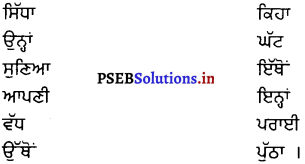
ਉੱਤਰ :
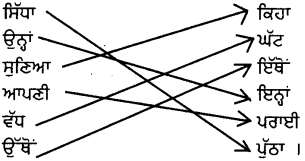
2. ਡਾ: ਮਹਿੰਦਰ ਸਿੰਘ ਰੰਧਾਵਾ ਦਾ ਜਨਮ 2 ਫ਼ਰਵਰੀ, 1909 ਈ: ਨੂੰ ਪਿਤਾ ਸ਼ੇਰ ਸਿੰਘ ਜੀ ਦੇ ਘਰ ਜ਼ੀਰਾ ਵਿਖੇ ਹੋਇਆ, ਉਨ੍ਹਾਂ ਦਾ ਜੱਦੀ ਪਿੰਡ ਬੋਦਲਾਂ (ਜ਼ਿਲ੍ਹਾ ਹੁਸ਼ਿਆਰਪੁਰ) ਹੈ। 1924 ਈ: ਵਿੱਚ ਖ਼ਾਲਸਾ ਹਾਈ ਸਕੂਲ ਮੁਕਤਸਰ ਤੋਂ ਦਸਵੀਂ ਅਤੇ ਗੌਰਮਿੰਟ ਕਾਲਜ ਲਾਹੌਰ ਤੋਂ 1930 ਈ: ਵਿੱਚ ਐੱਮ. ਐੱਸ – ਸੀ. ਕਰਨ ਪਿੱਛੋਂ 1934 ਈ: ਵਿੱਚ ਲੰਡਨੋਂ ਆਈ. ਸੀ. ਐੱਸ. ਦੀ ਪ੍ਰਤਿਯੋਗਤਾ ਪਾਸ ਕੀਤੀ। ਉਸ ਪਿੱਛੋਂ ਆਪ ਉੱਤਰ ਪ੍ਰਦੇਸ਼, ਦਿੱਲੀ, ਹਰਿਆਣਾ ਅਤੇ ਪੰਜਾਬ ਵਿੱਚ ਵੱਖ – ਵੱਖ ਉੱਚੇ ਅਹੁਦਿਆਂ ਉੱਤੇ ਕੰਮ ਕਰਦੇ ਰਹੇ ਤੇ ਫਿਰ ਆਪ ਨੂੰ ਚੰਡੀਗੜ੍ਹ ਦਾ ਮੁੱਖ ਕਮਿਸ਼ਨਰ ਲਾਇਆ ਗਿਆ ਬਾਅਦ ਵਿੱਚ ਇੱਕ ਅਰਸੇ ਲਈ ਆਪ ਪੰਜਾਬ ਖੇਤੀਬਾੜੀ ਯੂਨੀਵਰਸਿਟੀ ਲੁਧਿਆਣਾ ਦੇ ਉਪ – ਕੁਲਪਤੀ ਬਣੇ। ਆਪ ਵਲੋਂ ਬਨਸਪਤੀ ਵਿਗਿਆਨ ਦੇ ਸੰਬੰਧ ਵਿਚ ਕੀਤੀ ਖੋਜ ਉੱਤੇ ਪੰਜਾਬ ਯੂਨੀਵਰਸਿਟੀ, ਚੰਡੀਗੜ੍ਹ ਵਲੋਂ ਆਪ ਨੂੰ ਡਾਕਟਰੇਟ ਦੀ ਡਿਗਰੀ ਪ੍ਰਦਾਨ ਕੀਤੀ ਗਈ !

ਉਪਰੋਕਤ ਪੈਰੇ ਨੂੰ ਪੜ੍ਹ ਕੇ ਹੇਠ ਲਿਖੇ ਬਹੁਵਿਕਲਪੀ ਪ੍ਰਸ਼ਨਾਂ ਦੇ ਸਹੀ ਉੱਤਰ ਚੁਣੋ :
ਪ੍ਰਸ਼ਨ 1.
ਡਾ: ਰੰਧਾਵਾ ਦਾ ਜਨਮ ਕਿੱਥੇ ਹੋਇਆ ?
(ਉ) ਬਠਿੰਡਾ
(ਅ) ਸ੍ਰੀ ਮੁਕਤਸਰ ਸਾਹਿਬ
(ਇ) ਜ਼ੀਰਾ
(ਸ) ਫ਼ਰੀਦਕੋਟ।
ਉੱਤਰ :
(ੲ) ਜ਼ੀਰਾ।
ਪ੍ਰਸ਼ਨ 2.
ਡਾ: ਰੰਧਾਵਾ ਨੇ ਦਸਵੀਂ ਕਿਹੜੇ ਸਾਲ ਵਿੱਚ ਪਾਸ ਕੀਤੀ ?
(ਉ) 1924
(ਆ) 1920
(ੲ) 1930
(ਸ) 1934
ਉੱਤਰ :
(ਸ) 1934
ਪ੍ਰਸ਼ਨ 3.
ਡਾ: ਰੰਧਾਵਾ ਨੂੰ ਮੁੱਖ ਕਮਿਸ਼ਨਰ ਕਿਹੜੇ ਸ਼ਹਿਰ ਵਿੱਚ ਲਾਇਆ ਗਿਆ ?
(ਉ) ਅੰਮ੍ਰਿਤਸਰ
(ਆ) ਚੰਡੀਗੜ੍ਹ
(ੲ) ਜਲੰਧਰ
(ਸ) ਦਿੱਲੀ।
ਉੱਤਰ :
(ਅ) ਚੰਡੀਗੜ੍ਹ।
ਪ੍ਰਸ਼ਨ 4.
ਡਾ: ਮਹਿੰਦਰ ਸਿੰਘ ਰੰਧਾਵਾ ਨੇ ਪੰਜਾਬ ਯੂਨੀਵਰਸਿਟੀ ਤੋਂ ਕਿਹੜੀ ਡਿਗਰੀ ਪ੍ਰਾਪਤ ਕੀਤੀ ?
(ਉ) ਐੱਮ. ਏ.
(ਅ) ਡਾਕਟਰੇਟ
(ਈ) ਬੀ.ਐੱਡ.
(ਸ) ਬੀ.ਏ
ਉੱਤਰ :
(ਅ) ਡਾਕਟਰੇਟ

ਪਸ਼ਨ 5.
ਡਾ: ਮਹਿੰਦਰ ਸਿੰਘ ਰੰਧਾਵਾ ਦੇ ਪਿਤਾ ਦਾ ਨਾਂ ਕੀ ਸੀ ?
(ਉ) ਜਤਿੰਦਰ ਸਿੰਘ
(ਅ) ਮਹਿੰਦਰ ਸਿੰਘ
(ੲ) ਸ਼ੇਰ ਸਿੰਘ
(ਸ) ਬਹਾਦਰ ਸਿੰਘ
ਉੱਤਰ :
(ੲ) ਸ਼ੇਰ ਸਿੰਘ
ਪ੍ਰਸ਼ਨ 6.
ਉਪਰੋਕਤ ਪੈਰੇ ਵਿੱਚੋਂ ਖ਼ਾਸ ਨਾਂਵ ਦੀ ਠੀਕ ਉਦਾਹਰਨ ਚੁਣੋ :
(ੳ) ਲੁਧਿਆਣਾ
(ਅ) ਬਨਸਪਤੀ
(ੲ) ਵਿਗਿਆਨ
(ਸ) ਪਿੰਡ।
ਉੱਤਰ :
(ਉ) ਲੁਧਿਆਣਾ।
ਪ੍ਰਸ਼ਨ 7.
ਡਾ: ਮਹਿੰਦਰ ਸਿੰਘ ਰੰਧਾਵਾ ਨੇ ਆਈ. ਸੀ. ਐੱਸ. ਦੀ ਪ੍ਰਤਿਯੋਗਤਾ ਕਿੱਥੋਂ ਪਾਸ ਕੀਤੀ ?
(ੳ) ਇੰਗਲੈਂਡ
(ਅ) ਲੰਡਨ
(ੲ) ਅਮਰੀਕਾ
(ਸ) ਕੈਨੇਡਾ।
ਉੱਤਰ :
(ਅ) ਲੰਡਨ।
ਪ੍ਰਸ਼ਨ 8.
ਡਾ: ਮਹਿੰਦਰ ਸਿੰਘ ਰੰਧਾਵਾ ਵਲੋਂ ਕਿਹੜੇ ਵਿਸ਼ੇ ਦੇ ਸੰਬੰਧ ਵਿਚ ਖੋਜ ਕੀਤੀ ਗਈ ?
(ੳ) ਧੁਨੀ – ਵਿਗਿਆਨ
(ਅ) ਬਨਸਪਤੀ – ਵਿਗਿਆਨ
(ਈ) ਸਮਾਜ – ਵਿਗਿਆਨ
(ਸ) ਚਿੰਨ੍ਹ – ਵਿਗਿਆਨ।
ਉੱਤਰ :
(ਅ) ਬਨਸਪਤੀ ਵਿਗਿਆਨ !

ਪ੍ਰਸ਼ਨ 9.
ਡਾ: ਮਹਿੰਦਰ ਸਿੰਘ ਰੰਧਾਵਾ ਦਾ ਜੱਦੀ ਪਿੰਡ ਕਿਹੜਾ ਹੈ ?
(ਉ ਲੰਬੀ
(ਆ) ਤਰਨਤਾਰਨ
(ਈ) ਸ਼ੇਰਪੁਰ
(ਸ) ਬੋਦਲਾਂ
ਉੱਤਰ :
(ਸ) ਬੋਦਲਾਂ।
ਪ੍ਰਸ਼ਨ 10.
ਉਪਰੋਕਤ ਪੈਰੇ ਵਿੱਚ ਪੜਨਾਂਵ ਦੀ ਠੀਕ ਉਦਾਹਰਨ ਕਿਹੜੀ ਹੈ ?
(ਉ) ਜ਼ੀਰਾ
(ਅ) ਪੰਜਾਬ
(ਈ) ਖੋਜ
(ਸ) ਉਹਨਾਂ/ਆਪ।
ਉੱਤਰ :
(ਸ) ਉਹਨਾਂ/ਆਪ
ਪ੍ਰਸ਼ਨ 11.
ਪਿਤਾ ਸ਼ਬਦ ਦਾ ਲਿੰਗ ਬਦਲੋ :
(ੳ) ਮਾਮੀ
(ਅ) ਦਾਦੀ
(ਈ) ਮਾਤਾ
(ਸ) ਨਾਨੀ
ਉੱਤਰ :
(ਈ) ਮਾਤਾ
ਪ੍ਰਸ਼ਨ 12.
ਹੇਠ ਲਿਖਿਆਂ ਵਿੱਚੋਂ ਕਿਹੜਾ ਸ਼ਬਦ ਕਿਰਿਆ ਹੈ ?
(ਉ) ਹੁਸ਼ਿਆਰਪੁਰ
(ਅ) ਬੋਦਲਾਂ
(ਈ) ਰੂਪਨਗਰ
(ਸ) ਹੋਇਆ/ਕੀਤੀ/ਕਰਦੇ ਰਹੇ/ਲਾਇਆ ਗਿਆ/ਬਣੇ/ਕੀਤੀ ਗਈ।
ਉੱਤਰ :
(ਸ) ਹੋਇਆ/ਕੀਤੀ/ਕਰਦੇ ਰਹੇ/ਲਾਇਆ ਗਿਆ/ਬਣੇ/ਕੀਤੀ ਗਈ।

ਪ੍ਰਸ਼ਨ 13.
“ਪਹਾੜ ਇਸਤਰੀ – ਲਿੰਗ ਹੈ ਜਾਂ ਪੁਲਿੰਗ।
ਉੱਤਰ :
ਪੁਲਿੰਗ।
ਪ੍ਰਸ਼ਨ 14.
ਉਪਰੋਕਤ ਪੈਰੇ ਵਿੱਚੋਂ ਹੇਠ ਲਿਖੇ ਵਿਸਰਾਮ ਚਿੰਨ੍ਹ ਲਿਖੋ
(ਉ) ਜੋੜ੍ਹਨੀ
(ਅ) ਡੰਡੀ
(ਈ) ਕਾਮਾ
(ਸ) ਬੈਕਟ
ਉੱਤਰ :
(ਉ) ਜੋੜ੍ਹਨੀ (-)
(ਅ) ਡੰਡੀ (।)
(ਈ) ਕਾਮਾ (,)
(ਸ) ਬੈਕਟ {()}
ਪ੍ਰਸ਼ਨ 15.
ਉਪਰੋਕਤ ਪੈਰੇ ਵਿਚੋਂ ਵਿਰੋਧੀ ਸ਼ਬਦਾਂ ਦਾ ਮਿਲਾਣ ਕਰੋ
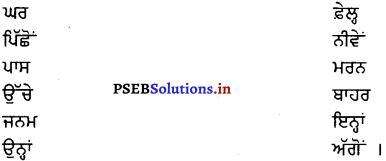
ਉੱਤਰ :
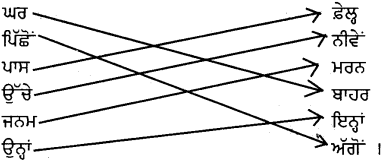

3. ਰੰਧਾਵਾ ਜੀ ਦੀ ਸ਼ਖ਼ਸੀਅਤ ਦਾ ਦੂਜਾ ਅਹਿਮ ਪੱਖ ਪੰਜਾਬ ਦੇ ਸੱਭਿਆਚਾਰ ਤੇ ਸਾਹਿਤ ਦੀ ਪ੍ਰਫੁੱਲਤਾ ਨਾਲ ਜੁੜਿਆ ਹੋਇਆ ਹੈ। ਰੰਧਾਵਾ ਜੀ ਇਸ ਪ੍ਰਭਾਵ ਬਾਰੇ ਸਪੱਸ਼ਟ ਸਨ ਕਿ ਪੱਛਮ ਦੀ ਰੋਸ਼ਨੀ ਪੰਜਾਬ ਦੇ ਘਰਾਂ ਦੀਆਂ ਅੰਦਰਲੀਆਂ ਨੁੱਕਰਾਂ ਤੱਕ ਪਹੁੰਚ ਰਹੀ ਹੈ। ਉਨ੍ਹਾਂ ਨੂੰ ਵਿਸ਼ਵਾਸ ਹੋ ਗਿਆ ਸੀ ਕਿ ਚੱਕੀ, ਚਿਮਟਾ, ਚਰਖਾ, ਪੀੜ੍ਹੀਆਂ ਤੇ ਮੁੜੇ ਛੇਤੀ – ਛੇਤੀ ਸਾਡੀ ਜ਼ਿੰਦਗੀ ਵਿੱਚੋਂ ਨਿਕਲ ਜਾਣਗੇ ਤੇ ਜੇ ਇਹ ਲਾਪਰਵਾਹੀ ਵਿੱਚ ਲੋਪ ਹੋ ਗਏ, ਤਾਂ ਪੰਜਾਬੀਆਂ ਦਾ ਅਮੀਰ ਵਿਰਸਾ ਅਲੋਪ ਹੋ ਜਾਵੇਗਾ।
ਆਪਣੇ ਅਮੀਰ ਸੱਭਿਆਚਾਰ ਨੂੰ ਸੰਭਾਲਨ ਲਈ ਡਾ: ਰੰਧਾਵਾ ਨੇ ਵਿਸ਼ੇਸ਼ ਉਪਰਾਲੇ ਕੀਤੇ ਵੱਡੇ – ਵੱਡੇ ਪਿੰਡਾਂ ਵਿੱਚ ਪੇਂਡੂ ਅਜਾਇਬ – ਘਰ ਬਣਵਾਏ। ਖੇਤੀ – ਬਾੜੀ ਯੂਨੀਵਰਸਿਟੀ, ਲੁਧਿਆਣਾ ਵਿੱਚ ਪੇਂਡੂ ਸੱਭਿਆਚਾਰ ਦਾ ਜਿਊਂਦਾ – ਜਾਗਦਾ ਅਜਾਇਬ – ਘਰ ਬਣਵਾਇਆ। ਇਸ ਅਜਾਇਬ – ਘਰ ਦੀ ਨਿਗਰਾਨੀ ਉਹ ਆਪ ਕਰਦੇ ਰਹੇ।
ਪਿੰਡਾਂ ਵਿੱਚ ਵਰਤੀਆਂ ਜਾਂਦੀਆਂ ਰਸੋਈ ਦੀਆਂ ਚੀਜ਼ਾਂ ਥਾਲ, ਕੌਲੇ, ਗਲਾਸ, ਛੰਨੇ ਤੇ ਮਿੱਟੀ ਦੀਆਂ ਟਿੰਡਾਂ, ਚੁਵੱਕਲੀ ਤੇ ਬੈੜ ਆਦਿ ਤੋਂ ਲੈ ਕੇ ਪੇਂਡੂ ਸਵਾਣੀਆਂ ਦੀਆਂ ਹੱਥੀਂ ਤਿਆਰ ਕੀਤੀਆਂ ਦਰੀਆਂ, ਫੁਲਕਾਰੀਆਂ ਤੇ ਬਾਗ ਇਸ ਅਜਾਇਬ – ਘਰ ਦੇ ਭੰਡਾਰ ਵਿੱਚ ਸ਼ਾਮਲ ਹਨ ਆਉਣ ਵਾਲੇ ਸਮਿਆਂ ਵਿੱਚ ਪੰਜਾਬ ਭਾਵੇਂ ਕਿੰਨਾ ਵੀ ਬਦਲ ਜਾਵੇ ਪਰ ਪੁਰਾਣੇ ਪੰਜਾਬ ਦਾ ਚਿਹਰਾ – ਮੁਹਰਾ ਵੇਖਣ ਲਈ ਇਹ ਅਜਾਇਬ – ਘਰ (ਜੋ ਅਮੀਰ ਸੱਭਿਆਚਾਰਿਕ ਵਿਰਸੇ ਨੂੰ ਸੰਭਾਲੀ ਬੈਠਾ ਨਾਨਕਸ਼ਾਹੀ ਇੱਟਾਂ ਦਾ ਬਣਿਆ ਹੈ। ਸ਼ੀਸ਼ੇ ਦਾ ਕੰਮ ਕਰੇਗਾ।
ਉਪਰੋਕਤ ਦਿੱਤੇ ਪੈਰੇ ਨੂੰ ਪੜ੍ਹ ਕੇ ਹੇਠ ਲਿਖੇ ਬਹੁਵਿਕਲਪੀ ਪ੍ਰਸ਼ਨਾਂ ਦੇ ਸਹੀ ਉੱਤਰ ਚੁਣੋ :
ਪ੍ਰਸ਼ਨ 1.
ਉਪਰੋਕਤ ਪੈਰਾ ਜਿਸ ਪਾਠ ਵਿਚੋਂ ਲਿਆ ਗਿਆ ਹੈ, ਉਸਦਾ ਲੇਖਕ ਕੌਣ ਹੈ ?
(ਉ) ਜਨਕਰਾਜ ਸਿੰਘ
(ਅ) ਸੁਖਦੇਵ ਮਾਦਪੁਰੀ
(ਇ) ਰਵਿੰਦਰ ਸਿੰਘ
(ਸ) ਪ੍ਰੋ: ਸੁਰਜੀਤ ਸਿੰਘ ਮਾਨ।
ਉੱਤਰ :
(ਉ) ਜਨਕਰਾਜ ਸਿੰਘ
ਪ੍ਰਸ਼ਨ 2.
ਡਾ: ਰੰਧਾਵਾ ਦੀ ਸ਼ਖ਼ਸੀਅਤ ਦਾ ਦੂਜਾ ਅਹਿਮ ਪੱਖ ਕਿਸ ਦੀ ਪ੍ਰਫੁਲਤਾ ਨਾਲ ਜੁੜਿਆ ਹੋਇਆ ਹੈ ?
(ਉ) ਪੰਜਾਬ ਦੇ ਸਭਿਆਚਾਰ ਤੇ ਸਾਹਿਤ ਦੀ
(ਅ) ਪੰਜਾਬ ਦੀ ਖੇਤੀਬਾੜੀ ਦੀ
(ਈ) ਪੰਜਾਬ ਦੇ ਵਿੱਦਿਅਕ ਖੇਤਰ ਦੀ
(ਸ) ਪੰਜਾਬ ਦੀ ਬਾਗ਼ਬਾਨੀ ਦੀ।
ਉੱਤਰ :
(ੳ) ਪੰਜਾਬ ਦੇ ਸਭਿਆਚਾਰ ਤੇ ਸਾਹਿਤ ਦੀ।
ਪ੍ਰਸ਼ਨ 3.
ਕਿਹੜੀ ਰੋਸ਼ਨੀ ਪੰਜਾਬ ਦੇ ਘਰਾਂ ਦੀਆਂ ਅੰਦਰਲੀਆਂ ਨੁੱਕਰਾਂ ਤਕ ਪਹੁੰਚ ਰਹੀ ਹੈ ?
(ਉ) ਪੂਰਬ ਦੀ
(ਅ) ਪੱਛਮ ਦੀ
(ਈ) ਦੱਖਣ ਦੀ
(ਸ) ਉੱਤਰ ਦੀ।
ਉੱਤਰ :
(ਅ) ਪੱਛਮ ਦੀ।

ਪ੍ਰਸ਼ਨ 4.
ਚੱਕੀ, ਚਿਮਟੇ, ਚਰਖੇ, ਪੀੜ੍ਹੀਆਂ ਤੇ ਮੂੜਿਆਂ ਦਾ ਸੰਬੰਧ ਕਿਸ ਨਾਲ ਹੈ ?
(ੳ) ਪੰਜਾਬ ਦੇ ਅਮੀਰ ਵਿਰਸੇ ਨਾਲ
(ਅ) ਕਸ਼ਮੀਰ ਦੇ ਅਮੀਰ ਵਿਰਸੇ ਨਾਲ
(ਈ) ਭਾਰਤ ਦੇ ਅਮੀਰ ਵਿਰਸੇ ਨਾਲ
(ਸ) ਪੱਛਮ ਦੇ ਅਮੀਰ ਵਿਰਸੇ ਨਾਲ।
ਉੱਤਰ :
(ਉ) ਪੰਜਾਬ ਦੇ ਅਮੀਰ ਵਿਰਸੇ ਨਾਲ !
ਪ੍ਰਸ਼ਨ 5.
ਡਾ: ਰੰਧਾਵਾ ਨੇ ਪੰਜਾਬ ਦੇ ਕਿਹੜੇ ਵਿਰਸੇ ਨੂੰ ਸੰਭਾਲਣ ਲਈ ਵਿਸ਼ੇਸ਼ ਉਪਰਾਲੇ ਕੀਤੇ ?
(ਉ) ਅਮੀਰ ਸਭਿਆਚਾਰਕ ਵਿਰਸੇ ਨੂੰ
(ਅ) ਅਮੀਰ ਪਰਿਵਾਰਕ ਵਿਰਸੇ ਨੂੰ
(ਏ) ਧਰਮਾਂ ਦੇ ਵਿਰਸੇ ਨੂੰ
(ਸ) ਜਾਤਾਂ – ਪਾਤਾਂ ਦੇ ਵਿਰਸੇ ਨੂੰ।
ਉੱਤਰ :
(ਉ) ਅਮੀਰ ਸਭਿਆਚਾਰਕ ਵਿਰਸੇ ਨੂੰ।
ਪ੍ਰਸ਼ਨ 6.
ਡਾ: ਰੰਧਾਵਾ ਨੇ ਵੱਡੇ – ਵੱਡੇ ਪਿੰਡਾਂ ਵਿਚ ਕੀ ਬਣਵਾਏ ?
(ਉ) ਪੰਚਾਇਤ ਘਰ
(ਅ) ਲਾਇਬਰੇਰੀਆਂ
(ਈ) ਸਕੂਲ
(ਸ) ਪੇਂਡੂ ਅਜਾਇਬ ਘਰ।
ਉੱਤਰ :
(ਸ) ਪੇਂਡੂ ਅਜਾਇਬ ਘਰ ਨੂੰ
ਪ੍ਰਸ਼ਨ 7.
ਡਾ: ਰੰਧਾਵਾ ਨੇ ਖੇਤੀਬਾੜੀ ਯੂਨੀਵਰਸਿਟੀ ਲੁਧਿਆਣਾ ਵਿਚ ਕੀ ਬਣਵਾਇਆ ?
(ਉ) ਪ੍ਰਮਾਣੂ ਖੋਜ ਕੇਂਦਰ
(ਅ) ਅਣੂ ਖੋਜ ਕੇਂਦਰ
(ਈ) ਸਭਿਆਚਾਰ ਦਾ ਅਜਾਇਬ – ਘਰ
(ਸ) ਚਿੜੀਆ – ਘਰ।
ਉੱਤਰ :
(ੲ) ਪੇਂਡੂ ਸਭਿਆਚਾਰ ਦਾ ਅਜਾਇਬ – ਘਰ।

ਪ੍ਰਸ਼ਨ 8.
ਮਿੱਟੀ ਦੀਆਂ ਟਿੰਡਾਂ, ਚੁਵੱਕਲੀ ਅਤੇ ਬੈੜ ਦਾ ਸੰਬੰਧ ਕਿਸ ਨਾਲ ਹੈ ?
(ਉ) ਪੁਰਾਤਨ ਟਿੰਡਾਂ ਵਾਲੇ ਖੂਹ ਨਾਲ
(ਅ) ਟਿਊਬਵੈਲ ਨਾਲ
(ਈ) ਗੱਡੇ ਨਾਲ
(ਸ) ਹਲ – ਪੰਜਾਲੀ ਨਾਲ !
ਉੱਤਰ :
(ੳ) ਪੁਰਾਤਨ ਟਿੰਡਾਂ ਵਾਲੇ ਖੂਹ ਨਾਲ।
ਪ੍ਰਸ਼ਨ 9.
ਪੇਂਡੂ ਸਭਿਆਚਾਰ ਦੇ ਅਜਾਇਬ – ਘਰ ਵਿਚ ਪੰਜਾਬ ਦੀਆਂ ਪੇਂਡੂ ਸਵਾਣੀਆਂ ਦੇ ਹੱਥਾਂ ਦੀਆਂ ਬਣੀਆਂ ਕਿਹੜੀਆਂ ਚੀਜਾਂ ਰੱਖੀਆਂ ਗਈਆਂ ਹਨ ?
(ਉ ਦਰੀਆਂ, ਬਾਗ਼ ਤੇ ਫੁਲਕਾਰੀਆਂ
(ਅ) ਕੱਪੜੇ
(ਈ) ਪੱਖੀਆਂ
(ਸ) ਮੂੜੇ।
ਉੱਤਰ :
(ਉ) ਦਰੀਆਂ, ਬਾਗ਼ ਤੇ ਫੁਲਕਾਰੀਆਂ।
ਪ੍ਰਸ਼ਨ 10.
ਪੇਂਡੂ ਜੀਵਨ ਦਾ ਅਜਾਇਬ – ਘਰ ਕਿਹੜੀਆਂ ਇੱਟਾਂ ਦਾ ਬਣਿਆ ਹੋਇਆ ਹੈ ?
(ਉ) ਨਵੀਆਂ ਇੱਟਾਂ ਦਾ
(ਅ) ਕੱਚੀਆਂ ਇੱਟਾਂ ਦਾ
(ਇ) ਅੱਵਲ ਇੱਟਾਂ ਦਾ
(ਸ) ਨਾਨਕਸ਼ਾਹੀ ਇੱਟਾਂ ਦਾ।
ਉੱਤਰ :
(ਸ) ਨਾਨਕਸ਼ਾਹੀ ਇੱਟਾਂ ਦਾ।
ਪ੍ਰਸ਼ਨ 1.
ਉਪਰੋਕਤ ਪੈਰੇ ਵਿਚ ਖ਼ਾਸ ਨਾਂਵ ਦੀ ਠੀਕ ਉਦਾਹਰਨ ਕਿਹੜੀ ਹੈ ?
(ੳ) ਰੰਧਾਵਾ/ਪੰਜਾਬ/ਪੱਛਮ/ਖੇਤੀਬਾੜੀ ਯੂਨੀਵਰਸਿਟੀ/ਲੁਧਿਆਣਾ
(ਅ) ਟਿੰਡਾਂ
(ਇ) ਨਾਨਕਸ਼ਾਹੀ
(ਸ) ਗਲਾਸ !
ਉੱਤਰ :
(ੳ) ਰੰਧਾਵਾ/ਪੰਜਾਬ/ਪੱਛਮ/ਖੇਤੀਬਾੜੀ ਯੂਨੀਵਰਸਿਟੀ/ਲੁਧਿਆਣਾ।

ਪ੍ਰਸ਼ਨ 12.
ਉਪਰੋਕਤ ਪੈਰੇ ਵਿਚੋਂ ਪੜਨਾਂਵ ਦੀ ਠੀਕ ਉਦਾਹਰਨ ਚੁਣੋ
(ੳ) ਉਹਨਾਂ/ਉਹ/ਆਪ/ਜੋ
(ਅ) ਅਜਾਇਬ – ਘਰ
(ਇ) ਪਿੰਡਾਂ
(ਸ) ਜ਼ਿੰਦਗੀ।
ਉੱਤਰ :
(ੳ) ਉਹਨਾਂ/ਉਹ/ਆਪ/ਜੋ।
ਪ੍ਰਸ਼ਨ 13.
ਉਪਰੋਕਤ ਪੈਰੇ ਵਿਚੋਂ ਵਿਸ਼ੇਸ਼ਣ ਦੀ ਠੀਕ ਉਦਾਹਰਨ ਚੁਣੋ
(ੳ) ਦੂਜਾ/ਅਹਿਮ/ਅੰਦਰਲੀਆਂ/ਅਮੀਰ/ਵਿਸ਼ੇਸ਼/ਵੱਡੇ – ਵੱਡੇ/ਪੇਂਡੂ/ਜਿਊਂਦਾ ਜਾਗਦਾ/ਨਾਨਕਸ਼ਾਹੀ
(ਅ) ਦਰੀਆਂ
(ਈ) ਖੇਤੀਬਾੜੀ
(ਸ) ਭੰਡਾਰ
ਉੱਤਰ :
(ੳ) ਦੂਜਾ/ਅਹਿਮ/ਅੰਦਰਲੀਆਂ/ਅਮੀਰ/ਵਿਸ਼ੇਸ਼/ਵੱਡੇ – ਵੱਡੇ/ਪੇਂਡੂ/ਜਿਊਂਦਾ ਜਾਗਦਾ/ਨਾਨਕਸ਼ਾਹੀ।
ਪ੍ਰਸ਼ਨ 14.
ਉਪਰੋਕਤ ਪੈਰੇ ਵਿਚ ਕਿਰਿਆ ਦੀ ਠੀਕ ਉਦਾਹਰਨ ਕਿਹੜੀ ਹੈ ?
ਉ) ਥਾਲ
(ਅ) ਆਪ
(ਈ) ਵਿਚ
(ਸ) ਜੁੜਿਆ ਹੋਇਆ ਹੈ/ਪਹੁੰਚ ਰਹੀ ਹੈਨਿਕਲ ਜਾਣਗੇ/ਹੋ ਗਏ ਹੋ/ਜਾਵੇਗਾ।/ਕੀਤੇ/ਬਣਵਾਏ/ਬਣਵਾਇਆ/ਕਰਦੇ ਰਹੇ/ਬਦਲ ਜਾਵੇਕਰੇਗਾ।
ਉੱਤਰ :
(ਸ) ਜੁੜਿਆ ਹੋਇਆ ਹੈ/ਪਹੁੰਚ ਰਹੀ ਹੈ/ਨਿਕਲ ਜਾਣਗੇ/ਹੋ ਗਏ/ਹੋ ਜਾਵੇਗਾ ਕੀਤੇ/ਬਣਵਾਏ/ਬਣਵਾਇਆ/ਕਰਦੇ ਰਹੇ/ਬਦਲ ਜਾਵੇਕਰੇਗਾ।

ਪ੍ਰਸ਼ਨ 15.
ਸਵਾਣੀਆਂ ਸ਼ਬਦ ਦਾ ਲਿੰਗ ਬਦਲੋ ?
(ੳ) ਮਰਦਾਂ
(ਅ) ਬੰਦਿਆਂ
(ਈ) ਨਰਾਂ
(ਸ) ਪੁਰਸ਼ਾਂ।
ਉੱਤਰ :
(ਉ) ਮਰਦਾਂ।
ਪ੍ਰਸ਼ਨ 16.
ਹੇਠ ਲਿਖਿਆਂ ਵਿਚੋਂ ਕਿਰਿਆ ਸ਼ਬਦ ਕਿਹੜਾ ਹੈ ?
(ੳ) ਕਰੇਗਾ
(ਅ) ਕਰਿੰਦਾ
(ਈ) ਕਾਮਾ
(ਸ) ਕਰਨਹਾਰ।
ਉੱਤਰ :
(ੳ) ਕਰੇਗਾ !
ਪ੍ਰਸ਼ਨ 7.
“ਫੁਲਕਾਰੀਆਂ ਅਤੇ ‘ਬਾਰਾ ਸ਼ਬਦ ਵਿਚੋਂ ਕਿਹੜਾ ਪੁਲਿੰਗ ਹੈ ?
ਉੱਤਰ :
ਬਾਗ
ਪ੍ਰਸ਼ਨ 18.
‘ਦਰੀਆਂ ਸ਼ਬਦ ਦਾ ਇਕਵਚਨ ਲਿਖੋ।
ਉੱਤਰ :
ਦਰੀ।

ਪ੍ਰਸ਼ਨ 19.
ਉਪਰੋਕਤ ਪੈਰੇ ਵਿਚੋਂ ਹੇਠ ਲਿਖੇ ਵਿਸਰਾਮ ਚਿੰਨ੍ਹ ਲਿਖੋ
(ਉ) ਡੰਡੀ
(ਅ) ਜੋੜਨੀ
(ਈ) ਕਾਮਾ
(ਸ) ਬੈਕਟ
(ਹ) ਬਿੰਦੀ
ਉੱਤਰ :
(ਉ) ਡੰਡੀ (।)
(ਅ) ਜੋੜਨੀ (-)
(ਈ) ਕਾਮਾ (,)
(ਸ) ਬੈਕਟ { () }
(ਹ) ਬਿੰਦੀ (.)
ਪ੍ਰਸ਼ਨ 20.
ਹੇਠਾਂ ਇਸ ਪੈਰੇ ਵਿਚੋਂ ਚੁਣੇ ਵਿਰੋਧੀ ਸ਼ਬਦਾਂ ਦਾ ਮਿਲਾਣ ਕਰੋ
ਉੱਤਰ :
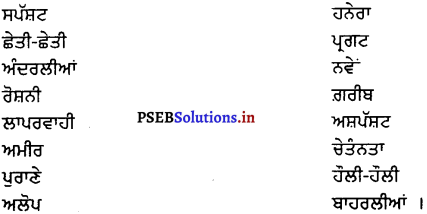
ਉੱਤਰ :
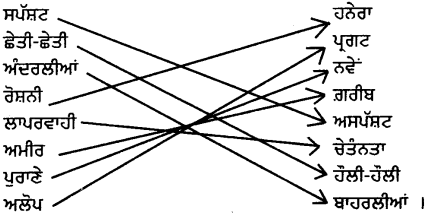

4. ਜੇ ਚੰਡੀਗੜ੍ਹ ਅੱਜ ਏਨਾ ਸੋਹਣਾ ਹੈ, ਤਾਂ ਇਹ ਡਾ: ਰੰਧਾਵਾ ਦਾ ਫੁੱਲ – ਬੂਟਿਆਂ ਅਤੇ ਸੋਹਣੇ ਦਰਖ਼ਤਾਂ ਨਾਲ ਪਿਆਰ ਦੇ ਸਦਕਾ ਹੀ ਹੈ। ਚੰਡੀਗੜ੍ਹ ਦੇ ਰੋਜ਼ਗਾਰਡਨ ਵਿਚ ਇੱਕ ਹਜ਼ਾਰ ਤੋਂ ਵੱਧ ਗੁਲਾਬ ਦੇ ਫੁੱਲਾਂ ਦੀਆਂ ਵੰਨਗੀਆਂ ਹਨ, ਜਿਹੜੀਆਂ ਦੂਜੇ ਮੁਲਕਾਂ ਅਤੇ ਰਾਜਾਂ ਤੋਂ ਉਚੇਚੇ ਤੌਰ ‘ਤੇ ਮੰਗਵਾਈਆਂ ਗਈਆਂ ਹਨ। ਚੰਡੀਗੜ੍ਹ ਦੀਆਂ ਸੜਕਾਂ ਦੇ ਦੋਹੀਂ ਪਾਸੀਂ ਲਾਉਣ ਲਈ ਸਜਾਵਟੀ ਬੂਟੇ ਅਤੇ ਦਰਖ਼ਤ ਦੂਰ – ਦੁਰਾਡੀਆਂ ਧਰਤੀਆਂ ਤੋਂ ਮੰਗਵਾਏ ਗਏ।
ਡਾ: ਰੰਧਾਵਾ ਵਲੋਂ ਚੰਡੀਗੜ੍ਹ ਦੇ ਸੈਕਟਰ 10 ਵਿਚ ਬਣਾਈਆਂ ਵੱਡੇ – ਵੱਡੇ ਕਲਾਕਾਰਾਂ ਦੀਆਂ ਕਲਾ – ਕਿਰਤਾਂ ਦੀ ਪ੍ਰਦਰਸ਼ਨੀ ਆਮ ਦਰਸ਼ਕ ਨੂੰ ਕੀਲ ਲੈਂਦੀ ਹੈ। ਸਮੇਂ – ਸਮੇਂ ਚਿਤਰਾਂ ਦੀ ਨੁਮਾਇਸ਼ ਲਾਉਣ ਲਈ ਇਕ ਵਿਸ਼ੇਸ਼ ਹਾਲ ਬਣਾਇਆ ਗਿਆ ਹੈ, ਜਿੱਥੇ ਕਿਸੇ ਨਾ ਕਿਸੇ ਕਲਾਕਾਰ ਦੀਆਂ ਪੇਂਟਿੰਗਜ਼ ਦੀ ਨੁਮਾਇਸ਼ ਲੱਗੀ ਹੀ ਰਹਿੰਦੀ ਹੈ।
ਰੰਧਾਵਾ ਸਾਹਿਬ ਦੇ ਜਤਨਾਂ ਤੇ ਪ੍ਰੇਰਨਾ ਸਦਕਾ ਹੀ ਕਲਾਕਾਰਾਂ ਨੂੰ ਉਤਸ਼ਾਹ ਦੇਣ ਲਈ ਉਨ੍ਹਾਂ ਦੀਆਂ ਕਲਾਕ੍ਰਿਤਾਂ ਨੂੰ ਖ਼ਰੀਦ ਕੇ ਸਰਕਾਰੀ ਦਫ਼ਤਰਾਂ ਅਤੇ ਅਮੀਰ ਲੋਕਾਂ ਦੇ ਘਰਾਂ ਵਿਚ ਸਜਾਇਆ ਜਾਂਦਾ ਹੈ। ਰੋਜ਼ ਗਾਰਡਨ ਦੇ ਉੱਤਰ ਵਾਲੇ ਹਿੱਸੇ ਵਿਚ ਪੰਜਾਬ ਦੇ ਸਾਹਿਤਕਾਰਾਂ, ਨਾਟਕਕਾਰਾਂ ਅਤੇ ਕਲਾਕਾਰਾਂ ਦੀਆਂ ਸ਼ਖ਼ਸੀਅਤਾਂ ਨੂੰ ਉੱਚਾ ਚੁੱਕਣ ਲਈ ‘ਪੰਜਾਬ ਕਲਾ ਪ੍ਰੀਸ਼ਦ ਨਾਂ ਦੀ ਇਕ ਸੰਸਥਾ ਕਾਇਮ ਕੀਤੀ, ਜਿੱਥੇ ਕੋਮਲ – ਕਲਾਵਾਂ ਨਾਲ ਜੁੜਨ ਵਾਲੇ ਲੋਕ ਇੱਕ – ਦੂਜੇ ਨਾਲ ਵਿਚਾਰ – ਵਟਾਂਦਰਾ ਕਰ ਕੇ ਆਪਣੇ ਤਜਰਬਿਆਂ ਨੂੰ ਅਮੀਰ ਬਣਾ ਸਕਣ।
ਡਾ: ਮਹਿੰਦਰ ਸਿੰਘ ਰੰਧਾਵਾ ਇਸ ਕਲਾ ਪ੍ਰੀਸ਼ਦ ਦੇ ਪਹਿਲੇ ਪ੍ਰਧਾਨ ਬਣੇ। ਉਨ੍ਹਾਂ ਪੁਰਾਣੀ ਅਤੇ ਨਵੀਂ ਪੀੜ੍ਹੀ ਦੇ ਹਜ਼ਾਰਾਂ ਕਲਾਕਾਰਾਂ ਨੂੰ ਉਤਸ਼ਾਹ ਦੇ ਕੇ ਉਨ੍ਹਾਂ ਦੀ ਕਲਾ ਦੀ ਕਦਰ ਕੀਤੀ ਤੇ ਆਮ ਲੋਕਾਂ ਦੀ ਪਹੁੰਚ ਦੇ ਕਾਬਲ ਬਣਾਇਆ। ਉਨ੍ਹਾਂ ਦੀ ਯਾਦ ਵਿਚ ‘ਰੰਧਾਵਾ ਆਡੀਟੋਰੀਅਮ’ ਬਣਾਇਆ ਗਿਆ।
ਉਪਰੋਕਤ ਪੈਰੇ ਨੂੰ ਪੜ੍ਹ ਕੇ ਹੇਠ ਲਿਖੇ ਬਹੁਵਿਕਲਪੀ ਪ੍ਰਸ਼ਨਾਂ ਦੇ ਸਹੀ ਉੱਤਰ ਚੁਣੋ :
ਪ੍ਰਸ਼ਨ 1.
ਡਾ: ਰੰਧਾਵਾ ਦਾ ਕਿਨ੍ਹਾਂ ਚੀਜ਼ਾਂ ਨਾਲ ਪਿਆਰ ਸੀ ?
(ਉ) ਸ਼ਹਿਰਾਂ ਨਾਲ
(ਅ) ਫੁੱਲ – ਬੂਟਿਆਂ ਤੇ ਸੋਹਣੇ ਰੁੱਖਾਂ ਨਾਲ
(ਈ) ਉੱਚੀਆਂ ਇਮਾਰਤਾਂ ਨਾਲ
(ਸ) ਫ਼ਿਲਮਾਂ ਨਾਲ।
ਉੱਤਰ :
(ਅ) ਫੁੱਲ – ਬੂਟਿਆਂ ਤੇ ਸੋਹਣੇ ਰੁੱਖਾਂ ਨਾਲ।
ਪ੍ਰਸ਼ਨ 2.
ਚੰਡੀਗੜ੍ਹ ਵਿਚ ਜਿੱਥੇ ਇਕ ਹਜ਼ਾਰ ਤੋਂ ਵੱਧ ਗੁਲਾਬ ਦੀਆਂ ਵੰਨਗੀਆਂ ਹਨ ?
(ਉ) ਰਾਕ ਗਾਰਡਨ ਵਿਚ
(ਅ) ਰੋਜ਼ ਗਾਰਡਨ ਵਿਚ
(ਈ) ਸੁਖਨਾ ਝੀਲ ਉੱਤੇ
(ਸ) ਸੜਕਾਂ ਉੱਤੇ।
ਉੱਤਰ :
(ਅ) ਰੋਜ਼ ਗਾਰਡਨ ਵਿਚ।

ਪ੍ਰਸ਼ਨ 3.
ਚੰਡੀਗੜ੍ਹ ਵਿਚ ਸੜਕਾਂ ਉੱਤੇ ਲਾਉਣ ਲਈ ਸਜਾਵਟੀ ਬੂਟੇ ਕਿੱਥੋਂ ਮੰਗਵਾਏ ਗਏ ?
(ਉ) ਨੇਪਾਲ ਤੋਂ
(ਅ) ਤਿੱਬਤ ਤੋਂ
(ਈ) ਪਾਕਿਸਤਾਨ ਤੋਂ
(ਸ) ਦੂਰ – ਦੁਰਾਡੀਆਂ ਧਰਤੀਆਂ ਤੋਂ।
ਉੱਤਰ :
(ਸ) ਦੂਰ – ਦੁਰਾਡੀਆਂ ਧਰਤੀਆਂ ਤੋਂ।
ਪ੍ਰਸ਼ਨ 4.
ਚੰਡੀਗੜ੍ਹ ਵਿਚ ਵੱਡੇ – ਵੱਡੇ ਕਲਾਕਾਰਾਂ ਦੀਆਂ ਕਲਾ – ਕਿਰਤਾਂ ਦੀ ਪ੍ਰਦਰਸ਼ਨੀ ਕਿੱਥੇ ਹੈ ?
(ਉ) ਸੈਕਟਰ 17
(ਅ) ਸੈਕਟਰ 22
(ੲ) ਸੈਕਟਰ 10
(ਸ) ਸੈਕਟਰ
ਉੱਤਰ :
(ਈ) ਸੈਕਟਰ 10.
ਪ੍ਰਸ਼ਨ 5.
ਕਲਾਕਾਰਾਂ ਦੀਆਂ ਪੇਂਟਿੰਗਾਂ ਦੀ ਨੁਮਾਇਸ਼ ਲਾਉਣ ਲਈ ਚੰਡੀਗੜ੍ਹ ਵਿਚ ਕੀ ਬਣਿਆ ਹੈ ?
(ਉ) ਮੈਦਾਨ
(ਆ) ਵਿਸ਼ੇਸ਼ ਹਾਲ
(ਈ) ਮਹੱਲ
(ਸ) ਅਜਾਇਬ – ਘਰ।
ਉੱਤਰ :
(ਅ) ਵਿਸ਼ੇਸ਼ ਹਾਲ।

ਪ੍ਰਸ਼ਨ 6.
ਪੰਜਾਬ ਦੇ ਸਾਹਿਤਕਾਰਾਂ, ਨਾਟਕਕਾਰਾਂ ਤੇ ਕਲਾਕਾਰਾਂ ਦੀਆਂ ਸ਼ਖ਼ਸੀਅਤਾਂ ਨੂੰ ਉੱਚਾ ਚੁੱਕਣ ਲਈ ਡਾ: ਰੰਧਾਵਾ ਨੇ ਕਿਹੜੀ ਸੰਸਥਾ ਕਾਇਮ ਕੀਤੀ ?
(ਉ) ਪੰਜਾਬ ਆਰਟ ਸਭਾ
(ਆ) ਪੰਜਾਬ ਕਲਾ ਕੇਂਦਰ
(ਈ) ਪੰਜਾਬ ਕਲਾ ਪ੍ਰੀਸ਼ਦ
(ਸ) ਪੰਜਾਬ ਪ੍ਰੀਸ਼ਦ।
ਉੱਤਰ :
ਪੰਜਾਬ ਕਲਾ ਪ੍ਰੀਸ਼ਦ।
ਪ੍ਰਸ਼ਨ 7.
ਪੰਜਾਬੀ ਕਲਾ ਪ੍ਰੀਸ਼ਦ ਦਾ ਪਹਿਲਾ ਪ੍ਰਧਾਨ ਕੌਣ ਸੀ ?
(ਉ) ਡਾ: ਮਹਿੰਦਰ ਸਿੰਘ ਰੰਧਾਵਾ
(ਅ) ਪ੍ਰੋ: ਮੋਹਨ ਸਿੰਘ
(ਈ) ਸੰਤ ਸਿੰਘ ਸੇਖੋਂ
(ਸ) ਬਲਰਾਜ ਸਾਹਨੀ।
ਉੱਤਰ :
ਉ) ਡਾ: ਮਹਿੰਦਰ ਸਿੰਘ ਰੰਧਾਵਾ।
ਪ੍ਰਸ਼ਨ 8.
ਡਾ: ਮਹਿੰਦਰ ਸਿੰਘ ਰੰਧਾਵਾ ਦੀ ਯਾਦ ਵਿਚ ਚੰਡੀਗੜ੍ਹ ਵਿਚ ਕੀ ਬਣਿਆ ਹੈ ?
(ੳ) ਰੰਧਾਵਾ ਆਡੀਟੋਰੀਅਮ
(ਅ) ਰੰਧਾਵਾ ਥੀਏਟਰ
(ਈ) ਰੰਧਾਵਾ ਕਲਾ ਸੰਗਮ
(ਸ) ਰੰਧਾਵਾ ਨਾਟ – ਘਰ।
ਉੱਤਰ :
(ੳ) ਰੰਧਾਵਾ ਆਡੀਟੋਰੀਅਮ।

ਪ੍ਰਸ਼ਨ 9.
ਨਵੀਂ ਪੀੜ੍ਹੀ ਦੇ ਹਜ਼ਾਰਾਂ ਕਲਾਕਾਰਾਂ ਨੂੰ ਕਿਸ ਨੇ ਉਤਸ਼ਾਹ ਦਿੱਤਾ ?
(ਉ) ਡਾ: ਮਹਿੰਦਰ ਸਿੰਘ ਰੰਧਾਵਾ ਨੇ
(ਅ) ਡਾ: ਮਨਮੋਹਨ ਸਿੰਘ ਨੇ
(ਈ) ਗਿ: ਜ਼ੈਲ ਸਿੰਘ ਨੇ
(ਸ) ਨਵੇਂ ਚੀਫ਼ ਕਮਿਸ਼ਨਰ ਨੇ।
ਉੱਤਰ :
(ੳ) ਡਾ: ਮਹਿੰਦਰ ਸਿੰਘ ਰੰਧਾਵਾ ਨੇ
ਪ੍ਰਸ਼ਨ 10.
ਉਪਰੋਕਤ ਪੈਰੇ ਵਿਚ ਆਮ ਨਾਂਵ ਦੀ ਠੀਕ ਉਦਾਹਰਨ ਚੁਣੋ
(ਉ) ਚੰਡੀਗੜ੍ਹ
(ਅ) ਡਾ: ਰੰਧਾਵਾ
(ਈ) ਉਹਨਾਂ
(ਸ) ਫੁੱਲ – ਬੂਟਿਆਂ/ਦਰਖ਼ਤਾਂ/ਗੁਲਾਬ/ਫੁਲਾਂ/ਵੰਨਗੀਆਂ/ਮੁਲਕਾਂ/ਰਾਜਾਂ/ਸੜਕਾਂ/ ਧਰਤੀ/ਬੂਟੇ/ਕਲਾਕਾਰਾਂ/ਨੁਮਾਇਸ਼ਹਾਲ/ਪੇਂਟਿੰਗਜ਼/ਸੈਕਟਰ/ਕਲਾ ਕਿਰਤਾਂ ਪ੍ਰਦਰਸ਼ਨੀ/ਦਰਸ਼ਕ/ਚਿਤਰਾਂ/ਦਫ਼ਤਰਾਂ/ਘਰਾਂ/ਹਿੱਸੇ/ਸਾਹਿਤਕਾਰਾਂ/ਨਾਟਕਕਾਰਾਂ/ ਸ਼ਖ਼ਸੀਅਤਾਂ ਕੋਮਲ – ਕਲਾਵਾਂ/ਸੰਸਥਾ/ਤਜਰਬਿਆਂ/ਪ੍ਰਧਾਨ/ਪੀੜ੍ਹੀ।
ਉੱਤਰ :
(ਸ) ਫੁੱਲ – ਬੂਟਿਆਂ/ਦਰਖ਼ਤਾਂ/ਗੁਲਾਬ/ਫੁਲਾਂ/ਵੰਨਗੀਆਂ/ਮੁਲਕਾਂ/ਰਾਜਾਂ/ਸੜਕਾਂ ਧਰਤੀ/ਬੂਟੇ/ਕਲਾਕਾਰਾਂ/ਨੁਮਾਇਸ਼ਹਾਲ/ਪੇਂਟਿੰਗਜ਼/ਸੈਕਟਰ/ਕਲਾ ਕਿਰਤਾਂ/ਪ੍ਰਦਰਸ਼ਨੀ ਦਰਸ਼ਕ/ਚਿਤਰਾਂ/ਦਫ਼ਤਰਾਂ/ਘ/ਹਿੱਸੇ /ਸਾਹਿਤਕਾਰਾਂ/ਨਾਟਕਕਾਰਾਂ/ਸ਼ਖ਼ਸੀਅਤਾਂ/ ਕੋਮਲ – ਕਲਾਵਾਂ/ਸੰਸਥਾ/ਤਜਰਬਿਆਂ/ਪ੍ਰਧਾਨ/ਪੀੜੀ।
ਪ੍ਰਸ਼ਨ 11.
ਉਪਰੋਕਤ ਪੈਰੇ ਵਿਚੋਂ ਖ਼ਾਸ ਨਾਂਵ ਦੀ ਠੀਕ ਉਦਾਹਰਨ ਚੁਣੋ
(ਉ) ਨੁਮਾਇਸ਼
(ਅ) ਹਾਲ
(ਈ) ਆਪਣੇ
(ਸ) ਚੰਡੀਗੜ੍ਹ ਰੋਜ਼ ਗਾਰਡਨ/ਸੈਕਟਰ 10/ਪੰਜਾਬ ਕਲਾ ਪ੍ਰੀਸ਼ਦ/ਰੰਧਾਵਾ ਆਡੀਟੋਰੀਅਮ।
ਉੱਤਰ :
(ਸ) ਚੰਡੀਗੜ੍ਹ ਰੋਜ਼ ਗਾਰਡਨ/ਸੈਕਟਰ 10/ਪੰਜਾਬ ਕਲਾ ਪ੍ਰੀਸ਼ਦਰੰਧਾਵਾ ਆਡੀਟੋਰੀਅਮ।
ਪ੍ਰਸ਼ਨ 12.
ਉਪਰੋਕਤ ਪੈਰੇ ਵਿਚੋਂ ਸੰਖਿਆਵਾਚਕ ਵਿਸ਼ੇਸ਼ਣ ਦੀ ਠੀਕ ਉਦਾਹਰਨ ਚੁਣੋ।
(ਉ) ਸੋਹਣਾ
(ਅ) ਏਨਾ
(ਈ) ਪੁਰਾਣੀ
(ਸ) ਇਕ ਹਜ਼ਾਰ ਤੋਂ ਵੱਧ/ਦੋਹੀਂ/10/ਇਕ/ਪਹਿਲੇ।
ਉੱਤਰ :
(ਸ) ਇਕ ਹਜ਼ਾਰ ਤੋਂ ਵੱਧ ਦੋਹੀਂ/10/ਇਕ/ਪਹਿਲੇ।

ਪ੍ਰਸ਼ਨ 13.
ਉਪਰੋਕਤ ਪੈਰੇ ਵਿਚੋਂ ਪੜਨਾਂਵ ਦੀ ਠੀਕ ਉਦਾਹਰਨ ਚੁਣੋ
(ਉ) ਜਿਹੜੀਆਂ/ਕਿਸੇ ਨਾ ਕਿਸੇ/ਉਹਨਾਂ/ਇਕ – ਦੂਜੇ/ਉਹਨਾਂ
(ਆ) ਕਲਾਕਾਰਾਂ।
(ਈ) ਕਲਾ
(ਸ) ਪੁਰਾਣੀ।
ਉੱਤਰ :
(ਉ) ਜਿਹੜੀਆਂ/ਕਿਸੇ ਨਾ ਕਿਸੇ/ਉਹਨਾਂ/ਇਕ – ਦੂਜੇ/ਉਹਨਾਂ !
ਪ੍ਰਸ਼ਨ 14.
ਉਪਰੋਕਤ ਪੈਰੇ ਵਿਚੋਂ ਕਿਰਿਆ ਦੀ ਠੀਕ ਉਦਾਹਰਨ ਚੁਣੋ
(ਉ) ਸੋਹਣਾ
(ਅ) ਕਲਾਕਾਰਾਂ
(ਇ) ਕਦਰ
(ਸ) ਹੈ/ਹਨ/ਮੰਗਵਾਈਆਂ ਗਈਆਂ ਹਨਮੰਗਵਾਏ ਗਏ/ਕੀਲ ਲੈਂਦੀ ਹੈ/ਬਣਾਇਆ ਗਿਆ ਹੈ/ਲੱਗੀ ਰਹਿੰਦੀ ਹੈ/ਸਜਾਇਆ ਜਾਂਦਾ ਹੈ/ਕੀਤੀਬਣਾ ਸਕਣਬਣੇ ਬਣਾਇਆ/ਬਣਾਇਆ ਗਿਆ।
ਉੱਤਰ :
(ਸ) ਹੈ/ਹਨਮੰਗਵਾਈਆਂ ਗਈਆਂ ਹਨ/ਮੰਗਵਾਏ ਗਏ/ਕੀਲ ਲੈਂਦੀ ਹੈ। ਬਣਾਇਆ ਗਿਆ ਹੈ/ਲੱਗੀ ਰਹਿੰਦੀ ਹੈ/ਸਜਾਇਆ ਜਾਂਦਾ ਹੈ/ਕੀਤੀ/ਬਣਾ ਸਕਣਬਣੇ ਬਣਾਇਆ/ਬਣਾਇਆ ਗਿਆ
ਪ੍ਰਸ਼ਨ 15.
ਉਪਰੋਕਤ ਪੈਰੇ ਵਿਚੋਂ ਹੇਠ ਲਿਖੇ ਵਿਸਰਾਮ ਚਿੰਨ੍ਹ ਲਿਖੋ
(ਉ) ਡੰਡੀ
(ਅ) ਜੋੜਨੀ
(ਈ) ਕਾਮਾ
(ਸ) ਇਕਹਿਰੇ ਪੁੱਠੇ ਕਾਮੇ
ਉੱਤਰ :
(ਉ) ਡੰਡੀ
(ਅ) ਜੋੜਨੀ
(ਈ) ਕਾਮਾ
(ਸ) ਇਕਹਿਰੇ ਪੁੱਠੇ ਕਾਮੇ

3. ਵਿਆਕਰਨ ਤੇ ਰਚਨਾਤਮਕ ਕਾਰਜ
ਪ੍ਰਸ਼ਨ 1.
ਕਿਰਿਆ ਵਿਸ਼ੇਸ਼ਣ ਕੀ ਹੁੰਦਾ ਹੈ ?
ਉੱਤਰ :
ਜੋ ਸ਼ਬਦ ਕਿਰਿਆ ਦੀ ਵਿਸ਼ੇਸ਼ਤਾ ਦੱਸੇ ਅਰਥਾਤ ਕਿਰਿਆ ਦਾ ਢੰਗ, ਸਮਾਂ ਜਾਂ ਸਥਾਨ ਪ੍ਰਗਟ ਕਰੇ ਜਾਂ ਵਿਸ਼ੇਸ਼ਤਾ ਦੱਸੇ, ਉਸ ਨੂੰ ‘ਕਿਰਿਆ – ਵਿਸ਼ੇਸ਼ਣ ਕਿਹਾ ਜਾਂਦਾ ਹੈ। ਅੱਗੇ ਲਿਖੇ ਵਾਕਾਂ ਨੂੰ ਧਿਆਨ ਨਾਲ ਪੜ੍ਹੋ
(ਉ) ਸ਼ੀਲਾ ਤੇਜ਼ ਤੁਰਦੀ ਹੈ।
(ਅ) ਕੁੱਤਾ ਉੱਚੀ – ਉੱਚੀ ਭੌਕਦਾ ਹੈ।
(ਏ) ਬੱਚੇ ਕੋਠੇ ਉੱਪਰ ਖੇਡਦੇ ਹਨ।
(ਸ) ਉਹ ਸਵੇਰੇ – ਸਵੇਰੇ ਸੈਰ ਕਰਨ ਜਾਂਦਾ ਹੈ।
ਇਨ੍ਹਾਂ ਵਾਕਾਂ ਵਿਚ ‘ਤੇਜ਼’, ‘ਉੱਚੀ – ਉੱਚੀ’, ‘ਕੋਠੇ ਉੱਪਰ’ ਤੇ ‘ਸਵੇਰੇ – ਸਵੇਰੇ’ ਸ਼ਬਦ ਕਿਰਿਆ ਵਿਸ਼ੇਸ਼ਣ ਹਨ।
ਪ੍ਰਸ਼ਨ 2.
ਕਿਰਿਆ ਵਿਸ਼ੇਸ਼ਣ ਕਿੰਨੀ ਪ੍ਰਕਾਰ ਦੇ ਹੁੰਦੇ ਹਨ ? ਹਰ ਇਕ ਬਾਰੇ ਵਿਸਥਾਰਪੂਰਵਕ ਲਿਖੋ।
ਉੱਤਰ :
ਕਿਰਿਆ ਵਿਸ਼ੇਸ਼ਣ ਅੱਠ ਪ੍ਰਕਾਰ ਦੇ ਹੁੰਦੇ ਹਨ
- ਕਾਲਵਾਚਕ ਕਿਰਿਆ ਵਿਸ਼ੇਸ਼ਣ – ਉਹ ਕਿਰਿਆ ਵਿਸ਼ੇਸ਼ਣ, ਜੋ ਕਿਰਿਆ ਦੇ ਕੰਮ ਦੇ ਹੋਣ ਦਾ ਸਮਾਂ ਦੱਸਣ ; ਜਿਵੇਂ – ਕਲ੍ਹ, ਜਦੋਂ, ਕਦੋਂ, ਉਦੋਂ, ਕਦ, ਕਦੀ, ਹੁਣ, ਸਵੇਰੇ, ਸ਼ਾਮ, ਦੁਪਹਿਰੇ, ਕੁਵੇਲੇ, ਸਵੇਲੇ, ਕਦੀ ਕਦਾਈਂ, ਸਮੇਂ ਸਿਰ ਆਦਿ।
- ਸਥਾਨਵਾਚਕ ਕਿਰਿਆ ਵਿਸ਼ੇਸ਼ਣ – ਜਿਨ੍ਹਾਂ ਕਿਰਿਆ ਵਿਸ਼ੇਸ਼ਣਾਂ ਤੋਂ ਕਿਰਿਆ ਦੇ ਕੰਮ ਦਾ ਸਥਾਨ ਪਤਾ ਲੱਗੇ; ਜਿਵੇਂ – ਉੱਪਰ, ਉੱਤੇ, ਥੱਲੇ, ਵਿਚ, ਵਿਚਕਾਰ, ਅੰਦਰ, ਬਾਹਰ, ਉਰੇ, ਪਰੇ, ਇਧਰ, ਉਧਰ, ਉੱਥੇ, ਇੱਥੇ, ਕਿਧਰ, ਜਿੱਥੇ, ਕਿੱਥੇ, ਨੇੜੇ, ਦੂਰ, ਸੱਜੇ, ਖੱਬੇ ਆਦਿ !
- ਪਰਿਮਾਣਵਾਚਕ ਕਿਰਿਆ ਵਿਸ਼ੇਸ਼ਣ – ਜਿਨ੍ਹਾਂ ਕਿਰਿਆ ਵਿਸ਼ੇਸ਼ਣਾਂ ਤੋਂ ਕਿਰਿਆ ਦੇ ਕੰਮ ਦੀ ਮਿਕਦਾਰ ਜਾਂ ਗਿਣਤੀ ਪਤਾ ਲੱਗੇ ; ਜਿਵੇਂ – ਘੱਟ, ਵੱਧ, ਕੁੱਝ, ਪੂਰਾ, ਥੋੜਾ, ਇੰਨਾ, ਕਿੰਨਾ, ਜਿੰਨਾ, ਜ਼ਰਾ, ਰਤਾ ਆਦਿ।
- ਕਾਰਵਾਚਕ ਕਿਰਿਆ ਵਿਸ਼ੇਸ਼ਣ – ਜਿਨ੍ਹਾਂ ਕਿਰਿਆ ਵਿਸ਼ੇਸ਼ਣਾਂ ਤੋਂ ਕਿਰਿਆ ਦੇ ਕੰਮ ਕਰਨ ਦਾ ਢੰਗ ਪਤਾ ਲੱਗੇ; ਜਿਵੇਂ – ਇੰਦ, ਉੱਦ, ਇਸ ਤਰ੍ਹਾਂ, ਉੱਦਾਂ, ਇੱਦਾਂ, ਜਿਵੇਂ, ਕਿਵੇਂ, ਹੌਲੀ, ਧੀਰੇ, ਛੇਤੀ ਆਦਿ।
- ਕਾਰਨਵਾਚਕ ਕਿਰਿਆ ਵਿਸ਼ੇਸ਼ਣ – ਜਿਨ੍ਹਾਂ ਕਿਰਿਆ ਵਿਸ਼ੇਸ਼ਣਾਂ ਤੋਂ ਕਿਰਿਆ ਦੇ ਕੰਮ ਦਾ ਕਾਰਨ ਪਤਾ ਲੱਗੇ ; ਜਿਵੇਂ – ਕਿਉਂਕਿ, ਤਾਂ ਕਿ, ਇਸ ਕਰਕੇ, ਤਾਂ, ਤਦੇ ਹੀ ਆਦਿ।
- ਸੰਖਿਆਵਾਚਕ ਕਿਰਿਆ ਵਿਸ਼ੇਸ਼ਣ – ਜਿਨ੍ਹਾਂ ਕਿਰਿਆ ਵਿਸ਼ੇਸ਼ਣਾਂ ਤੋਂ ਕਿਰਿਆ ਦੇ ਕੰਮ ਦੀ ਗਿਣਤੀ ਜਾਂ ਦਹਰਾਓ ਪਤਾ ਲੱਗੇ : ਜਿਵੇਂ – ਇਕਹਿਰਾ, ਦੋਹਰਾ, ਡਿਉਢਾ, ਕਈ ਵਾਰ, ਘੜੀ – ਮੜੀ ਇਕ – ਇਕ, ਦੋ – ਦੋ, ਦੁਬਾਰਾ ਆਦਿ।
- ਨਿਸਚੇਵਾਚਕ ਕਿਰਿਆ ਵਿਸ਼ੇਸ਼ਣ – ਜਿਨ੍ਹਾਂ ਕਿਰਿਆ ਵਿਸ਼ੇਸ਼ਣਾਂ ਦੀ ਵਰਤੋਂ ਕਿਰਿਆ ਦੇ ਕੰਮ ਦੀ ਤਾਕੀਦ ਜਾਂ ਪਕਿਆਈ ਲਈ ਕੀਤੀ ਜਾਂਦੀ ਹੈ; ਜਿਵੇਂ – ਜ਼ਰੂਰ, ਬਿਲਕੁਲ, ਵੀ, ਹੀ, ਠੀਕ, ਆਹੋ, ਬੇਸ਼ੱਕ, ਸਤਿਬਚਨ, ਬਹੁਤ ਅੱਛਾ, ਸ਼ਾਇਦ, ਹਾਂ ਜੀ, ਆਦਿ।
- ਨਿਰਣਾਵਾਚਕ ਕਿਰਿਆ ਵਿਸ਼ੇਸ਼ਣ – ਜੋ ਕਿਰਿਆ – ਵਿਸ਼ੇਸ਼ਣ ਕਿਸੇ ਕਿਰਿਆ ਦੇ ਕੰਮ ਦੇ ਹੋਣ ਜਾਂ ਨਾ ਹੋਣ ਸੰਬੰਧੀ ਨਿਰਣਾ ਪ੍ਰਗਟ ਕਰਦੇ ਹਨ , ਜਿਵੇਂ – ਨਹੀਂ, ਕਦੇ ਨਹੀਂ, ਨਿੱਜ, ਮਤੇ, ਬਿਲਕੁਲ, ਨਾ ਜੀ, ਜੀ ਨਹੀਂ, ਨਹੀਂ ਜੀ ਆਦਿ।

ਪ੍ਰਸ਼ਨ 3.
ਡਾ: ਮਹਿੰਦਰ ਸਿੰਘ ਰੰਧਾਵਾ ਤੋਂ ਇਲਾਵਾ ਪੰਜਾਬ, ਪੰਜਾਬੀ ਅਤੇ ਪੰਜਾਬੀਅਤ ਨਾਲ ਪਿਆਰ ਕਰਨ ਵਾਲੀ ਕਿਸੇ ਹੋਰ ਸ਼ਖ਼ਸੀਅਤ ਬਾਰੇ ਕੁੱਝ ਵਾਕ ਲਿਖੋ।
ਉੱਤਰ :
ਬਲਰਾਜ ਸਾਹਨੀ ਪੰਜਾਬ, ਪੰਜਾਬੀ ਤੇ ਪੰਜਾਬੀਅਤ ਨੂੰ ਪਿਆਰ ਕਰਨ ਵਾਲਾ ਇਕ ਮਹਾਨ ਲੇਖਕ ਤੇ ਫ਼ਿਲਮ ਕਲਾਕਾਰ ਹੋਇਆ ਹੈ। ਉਸਦੀ ਵਿੱਦਿਅਕ ਯੋਗਤਾ ਭਾਵੇਂ ਅੰਗਰੇਜ਼ੀ ਦੀ ਐੱਮ. ਏ. ਸੀ ਤੇ ਪਹਿਲਾਂ ਪਹਿਲਾਂ ਉਸ ਨੇ ਅੰਗਰੇਜ਼ੀ ਵਿਚ ਹੀ ਲਿਖਣਾ ਆਰੰਭ ਕੀਤਾ, ਪਰੰਤੂ ਡਾ: ਰਾਵਿੰਦਰ ਨਾਥ ਟੈਗੋਰ ਦੀ ਪ੍ਰੇਰਨਾ ਨਾਲ ਉਹ ਪੰਜਾਬੀ ਲਿਖਣ ਲੱਗਾ।ਉਹ ਪੰਜਾਬੀ ਬੋਲੀ ਤੇ ਸਭਿਆਚਾਰ ਨੂੰ ਬਹੁਤ ਪਿਆਰ ਕਰਦਾ ਸੀ।
ਉਹ ਜਦੋਂ ਕਦੇ ਪਿੰਡਾਂ ਵਿਚ ਜਾਂਦਾ, ਤਾਂ ਉਹ ਤੰਬਾ ਲਾ ਕੇ ਹਲ ਵਾਹੁਣ ਲੱਗ ਪੈਂਦਾ। ਉਹ ਆਪਣੀ ਮਾਂ ਦੀ ਮੰਗ ਪੂਰੀ ਕਰਨ ਲਈ ਚਰਖੇ ਨੂੰ ਹਵਾਈ ਜਹਾਜ਼ ਰਾਹੀਂ ਮੁੰਬਈ ਲੈ ਕੇ ਗਿਆ। ਉਹ ਆਪਣੇ ਜੀਵਨ ਦੇ ਅੰਤ ਤਕ ਪੰਜਾਬੀ ਵਿਚ ਲਿਖਦਾ ਰਿਹਾ ਤੇ ਪੰਜਾਬੀਅਤ ਨੂੰ ਪਿਆਰ ਕਰਦਾ ਰਿਹਾ।
ਪ੍ਰਸ਼ਨ 4.
ਪੰਜਾਬ ਦਾ ਸੁਪਨਸਾਜ਼ : ਡਾ: ਮਹਿੰਦਰ ਸਿੰਘ ਰੰਧਾਵਾਂ ਪਾਠ ਵਿਚ ਖੇਤੀਬਾੜੀ ਨਾਲ ਸੰਬੰਧਿਤ ਕੁੱਝ ਸੰਦਾਂ ਦਾ ਜ਼ਿਕਰ ਆਇਆ ਹੈ, ਉਨ੍ਹਾਂ ਦੇ ਨਾਂ ਲਿਖੋ।
ਉੱਤਰ :
ਟੈਕਟਰ, ਟਿਊਬਵੈੱਲ ਤੇ ਮਿੱਟੀ ਦੀਆਂ ਟਿੰਡਾਂ ਆਦਿ।
4. ਔਖੇ ਸ਼ਬਦਾਂ ਦੇ ਅਰਥ
- ਬਹੁਪੱਖੀ – ਕਈ ਪੱਖਾਂ ਵਾਲਾ ਕਾਰਜ
- ਖੇਤਰ – ਕੰਮ ਕਰਨ ਦਾ ਘੇਰਾ।
- ਅੰਦਾਜ਼ – ਤੌਰ ਤਰੀਕਾ
- ਪ੍ਰਤੀਯੋਗਤਾ – ਮੁਕਾਬਲਾ।
- ਵਿਕਾਸ – ਉੱਨਤੀ।
- ਹੁਨਰ – ਕਲਾ, ਮੁਹਾਰਤ
- ਪ੍ਰਮਾਣਿਕ – ਪੱਕਾ, ਸਬੂਤ ਵਾਲਾ।
- ਵਿਸ਼ਾਲ – ਵੱਡਾ
- ਸਿਰਜਣਾ – ਰਚਨਾ
- ਪਸਾਰ – ਖਿਲਾਰਾ।
- ਵਿਰਸਾ – ਪੁਰਖਿਆਂ ਤੋਂ ਮਿਲਣ ਵਾਲੀ ਵਸਤੂ।
![]()
![]()
![]()
![]()
![]()


